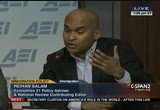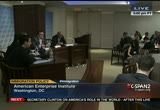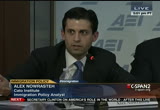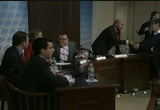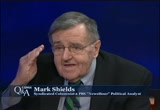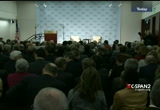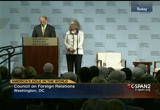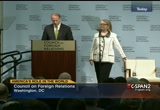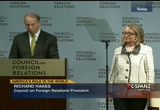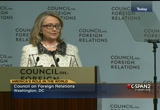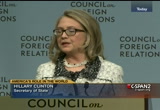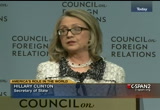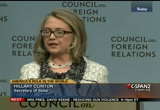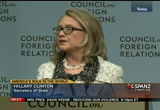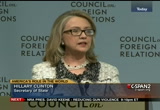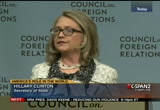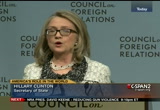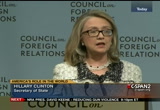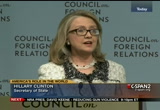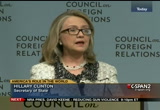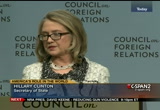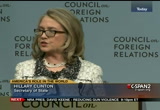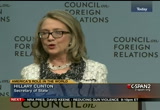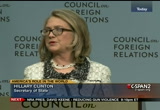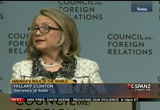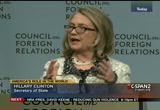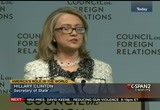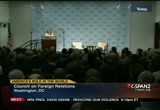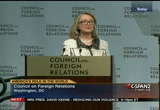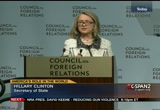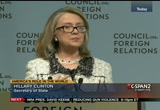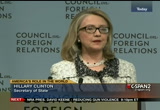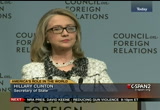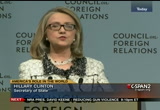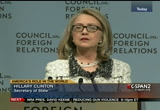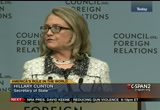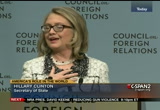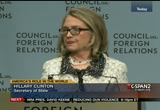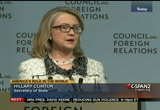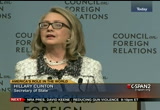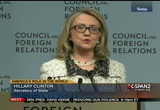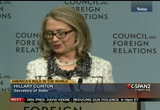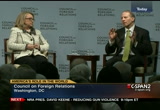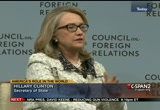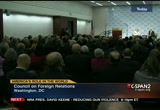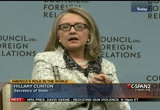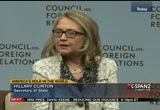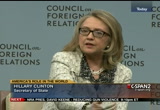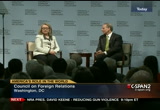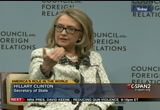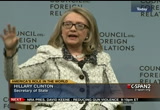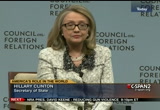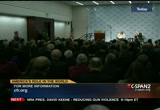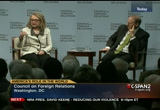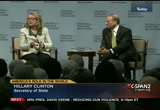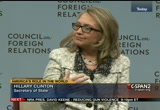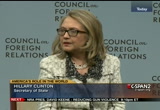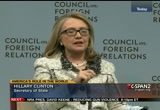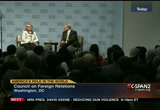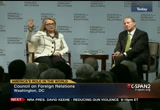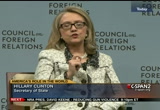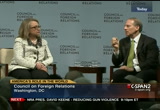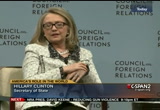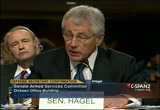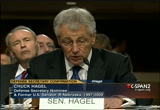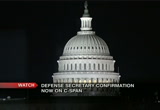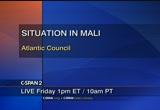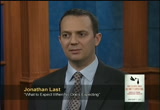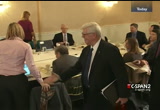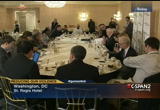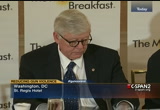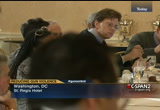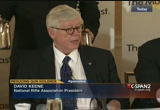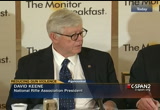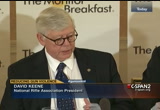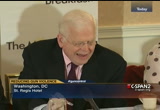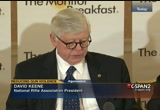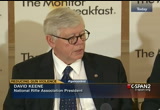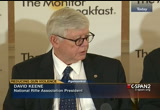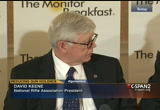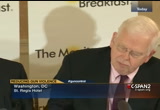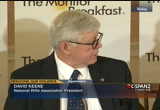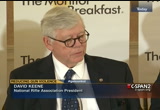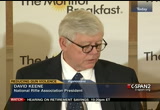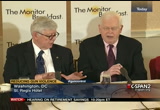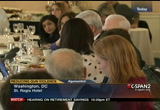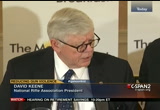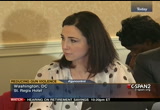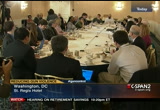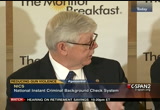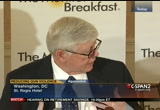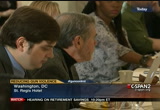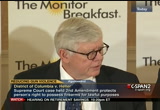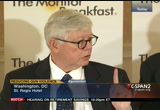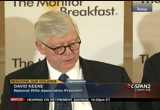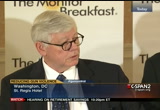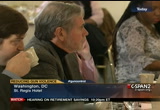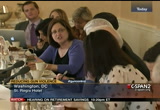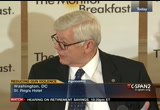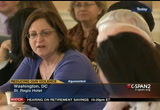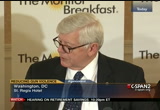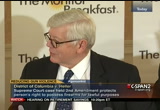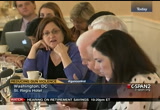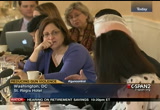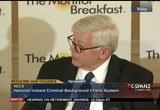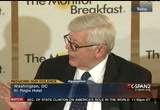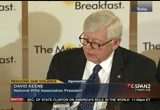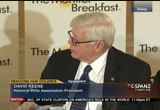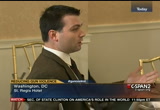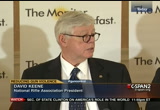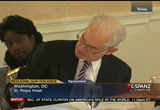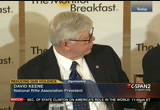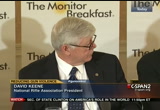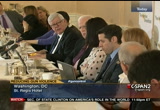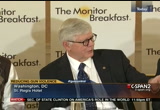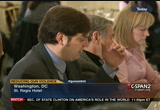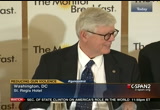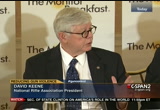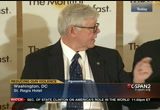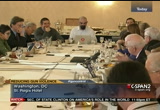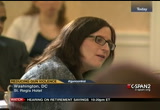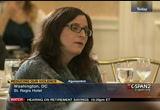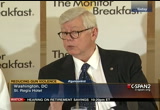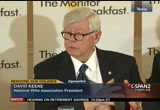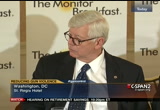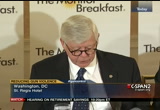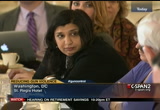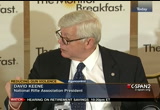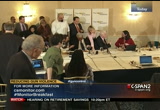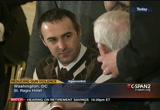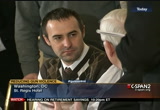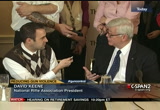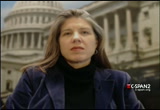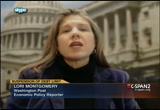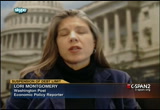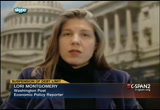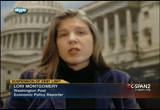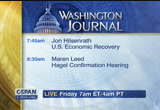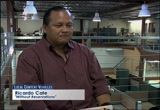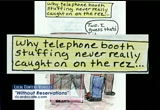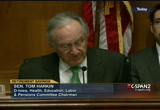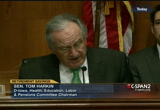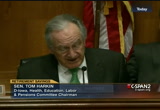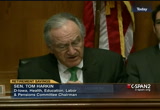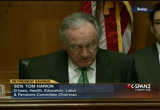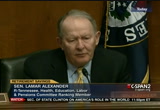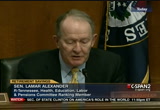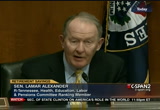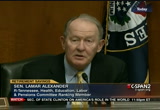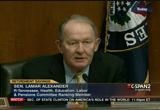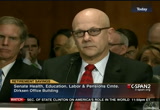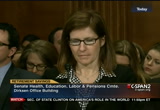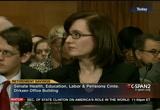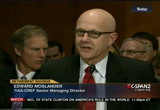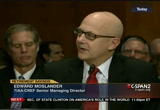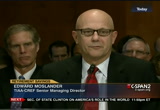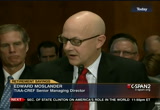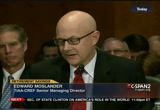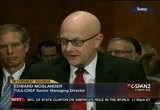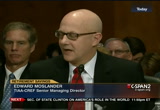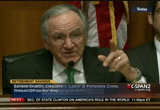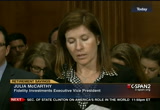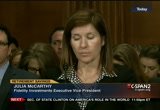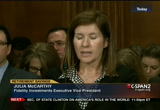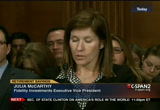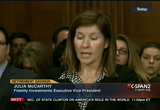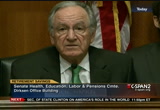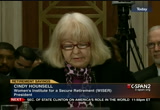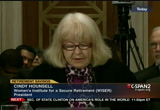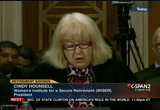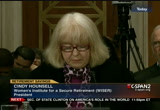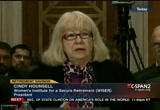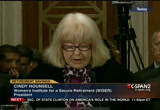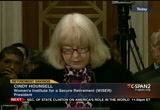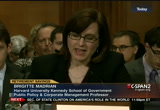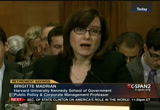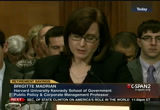tv Tonight From Washington CSPAN January 31, 2013 8:00pm-11:00pm EST
8:00 pm
attractive piece of the legislation and less attractive piece of the legislation. he saw similar dynamic. you saw just the expanding provision in law it wouldn't look -- if you only had the revenue provision of the affordable care act this looks like a massive tax increase in you combine those into a single piece of legislation suddenly looks attractive. is the exact same dynamic and that is why we should encourage a more piecemeal approach and why unfortunate we didn't get more progress. the question is who are the roadblocks to the progress and it would have been good if some of the advocates of high skills recognize that i made a lot of noise about it but their feeling was let's put aside. >> i worry about the guestworker program. you need to deal with future flows. you can just take all the undocumented workers and give them a the legal -- because you don't do anything to
8:01 pm
remove the magnet from illegal immigration in five or 10 down -- years down the road you are dealing with the same thing. with the afl-cio and some unions and left-leaning groups opposed to expanding the guestworker program i worry that the blanket pathways to citizenship or legal status where the want to call it and leave the guestworker part out of it and we don't solve any problem and gave politics are just as bad for us in the next 10 years. >> quite frankly don't trust congress so if congress can't make the contracts, the first thing that will come down is who will be high-skilled or -- if the was enforcement only and they said oh yeah by the way we are definitely going to do a low-skilled thing of future and do high-skilled i wouldn't support the enforcement only because i don't trust them. i think they will stop after stop after that about this over the last couple of years when they did these peaceful approach is a lot of them failed. the immigration act that moved
8:02 pm
the countries of origin toward a green card, greenlaw stopped in the house. had stopped after it passed in the house. unfortunately there is a political strategy going on now. i personally think it only matters if it's if it's a road to an and i think that's always going the way it's going now. >> without, thank you all for coming. there will be orders for drinks in the lobbies if you want to come back. [applause] [inaudible conversations] [inaudible conversations]
8:03 pm
>> john mccain's 2000 campaign when he ran for president is the most memorable campaign of any that i have ever covered. i mean it was just, we will never see it again and here he was you know facing george w. bush who had all the face cards of the republican party backing him and the three republican governors in new hampshire and all the money and john mccain held 114 and he stayed there until every question was answered. you could see the lightbulb going off in people's heads. when will we get the patients bill of rights and john mccain
8:04 pm
would say we are going to get a patients bill of rights. the democrats are owned by the trial orders. next question. it was just refreshing candor and you would see it in people's response and then he was totally open to the press. i mean there was a candor and openness and a welcome is that no one had seen before and no one certainly have seen since. >> now secretary of state hillary clinton on the u.s. role in the world. she's at the council of foreign relations today for now and will meet with president from the white house tomorrow, her last day as secretary. her successor senator john kerry will be at the state department monday for a welcoming ceremony.
8:05 pm
[inaudible conversations] [applause] [applause] >> please take your seats. good afternoon and on behalf of bob rubin, carla he'll who is with us today, the entire board of directors and their members can't i want to welcoming you to the council on foreign relations and i'm richard haas president of cfr. are those of you who don't know who we are, we are an independent nonpartisan membership organization of think-tank and a publisher and we are dedicated to improving the understanding of the world of the foreign-policy choices facing this country.
8:06 pm
and today we are continuing what we have come to call secretary of state week here in the council. on tuesday night we were fortunate to hear from george shultz, who served as secretary of state for some six and a half years under president ronald reagan. and this afternoon we are honored to host hillary rodham clinton. during her last 24 hours as president obama's first president obama's first secretary of state and immediately afterwards and told she might be expected to party like it's cartagena all over again. [laughter] we did a research and this is the eighth time that hillary clinton has spoken at the council and her third appearance in and her current incarnation as secretary of state. this afternoon speech is probably the most anticipated one she has given here and indeed it may be the most anticipated farewell address since 1796. [laughter] i suspect though that her views
8:07 pm
on untangling alliances might be somewhat different than george washington's. much has been made of the mile she has put in as the country's 67 secretary of state. you've seen the using the statistics. she has visited 112 countries and locked -- miles of flight time. more important than that madam secretary is what you have put into these miles and your 10 years coincide with what the most consequential events and decisions of this young century the balancing american foreign policy toward asia, winding down the war in iraq and after the surge the war in afghanistan, contending with a difficult and dangerous transitions of the airport and building a multilateral coalition for tough sanctions against iran. you have also elevated the profile of traditional social issues women interment freedom and more on the seventh floor of the building you oversee. and if done all this and more against the backdrop of
8:08 pm
historical economic downturn that sharply limited every country's room to maneuver. so i know i speak for everyone in this room and beyond when i say thank you for your dedicated service to this country. [applause] the way we are going to proceed as secretary clinton will deliver her speech after which we will have time given her schedule for a few questions. madam secretary, the floor is yours. >> thank you richard for that introduction and for everything you have done to lead this very valuable institution. i also want to thank the board of the council on foreign relations and all my friends and colleagues and other interested citizens who are here today, because you respect the council and you understand the important work that it does and you are
8:09 pm
committed to ensuring that we chart a path to the future that is in the best interest of not only the united states but the world. as as richard said, tomorrow's my last day as secretary of state and the wood is hard to predict what any day in this job will bring i know that tomorrow my heart will be very full. serving with the men and women of the state department and usaid has been a singular honor. and secretary kerry will find there is no more extraordinary group of people working anywhere in the world. so these last days have been bittersweet for me, but this opportunity that i have here before you gives me some time to reflect on the distance traveled and to take stock of what we have done and what is left to do.
8:10 pm
i think it's important as richard alluded in his opening comments, what we faced in january of 2009. two wars come to an economy in, traditional alliances fraying, are diplomatic standing damaged, and around the world people questioning america's commitments to core values and their ability to maintain our global leadership. that was my inbox on day one as your secretary of state. today conclave the world remains a dangerous and complicated place and of course we still face many difficult challenges. but a lot has changed in the last four years. under president obama's leadership we have ended the war in iraq, begun a transition in afghanistan and brought osama bin laden to justice. we have also revitalized american diplomacy and strengthen our alliances. and while our economic recovery
8:11 pm
is not yet complete, we are heading in the right direction. in short, america today is stronger at home and more respected in the world. and our global leadership is on firmer footing than many predicted. to understand what we have been trying to do these last four years, it's helpful to start with some history. last year i was honored to deliver the forest all lecture at the naval academy named for first secretary of defense after world war ii. in 1946, james forest all noted in his diary that the soviets believed that the post-war world should be shaped by a handful of major powers acting alone but he went on the american point of view is that all nations professing a desire for peace and democracy should participate and what ended up happening in the years since his something in
8:12 pm
between or. the united states and our allies succeeded in constructing a broad international architecture of alliances chiefly the u.n. the imf the world bank and nato that protected our interest and benefited people and nations around the world. yet it is undeniable that a handful of major powers did end up controlling those institutions, setting norms and shaping international affairs. now two decades after the end of the cold war, we faced a different world. more countries than ever have a voice in global debates. we see more paths to power opening up as nations gain influence to the strength of their economies rather than their militaries are going political and technological changes are empowering nonstate actors, like active this, corporations and terrorist networks. at the same time, we face
8:13 pm
challenges from financial contagion to climate change to human and wildlife trafficking that spill across borders and defy unilateral solutions. as president obama has said, the old post-war architecture is crumbling under the weight of new threats. so the geometry of global power has become more distributed and diffused as the challenges we face have become more complex and crosscutting. so the question we ask ourselves every day is, what does this mean for america? and then we go on to say how can we advance their own interests and also uphold a just, rules-based international order, a system that does provide clear rules of the road for everything from intellectual property right to freedom of navigation to fair labor standards? simply put, we have to be smart about how we use our power not
8:14 pm
because we have less of it. indeed the mite of our military and the size of our economy and the influence of our diplomacy and the creative energy of our people remains unrivaled. no, it's because as the world has changed so too has the leverage and power that can most effectively shape international affairs. i have come to think of it like this. truman and acheson were building the parthenon with classical geometry and clear lines. the pillars were a handful of big institutions and alliances dominated by the major powers and that structure delivered unprecedented peace and prosperity. but time takes its toll even on the greatest edifice. and we do need a new architecture for this new world. more frank gehry ben formal
8:15 pm
greek. [laughter] think of it. now some of his work at first might appear haphazard but in fact it's highly intentional and sophisticated. where once a few strong columns could hold up the weight of the world, today we need a dynamic mix of materials and structures. now of course american military and economic strength will remain the foundation of our global leadership or go as we saw from the intervention to stop the massacre in libya to the rate that brought bin laden to justice, there will always be times when it is necessary and just to use force. america's ability to protect power all over the globe remains essential. and i'm very proud of the partnership that the state department has forms with the pentagon first with bob gates and then mike mullen and then leon panetta and marty dempsey. by the same token america's traditional allies and friends
8:16 pm
in europe and east asia remains a valuable partners on nearly everything we do and we have spent considerable energy strengthening those bonds over the past four years. and i would be quick to add the u.n., the imf and the world bank and nato are also still essential. but all of our institutions and our relationships need to be modernized, and complemented by new institutions, relationships and partnerships that are tailored for new challenges and modeled to the needs of a variable landscape. like how we elevated the g20 during the financial crisis or created the climate and clean air coalition out of the state department to fight short-lived pollutants like black carbon or work with partners like turkey, where the two listed up the first global counterterrorism form. we are also working more than
8:17 pm
ever with invigorated regional organizations. consider the african union in somalia and the arab league in libya, even subregional groups like the lower mekong initiative that we created to help reintegrate verma into its neighborhood and to try to work across national boundaries on issues like whether dams should or should not be built. we are also of course thinking about old-fashioned shoe leather diplomacy and a new way. i have found it and i've said it before, highly ironic that in today's world when we can be anywhere virtually more than ever people want us to actually show up. but while a secretary of state in an earlier era might have been able to focus on a small number of influential capitals, so bling between the major powers, today we fight said must take a broader view. and people say the meal the
8:18 pm
time -- i look at your trevor scheduled. y. togo? well compound no secretary of state has ever been to togo. togo has seized on the u.n. security council. it's not just where we engage but with whom. you can't build a set of durable partnerships in the 21st century with governments alone. the opinions of people now matter as to how their governments work with us, whether it's democratic or authoritarian. so in virtually every country i've visited, i have held town halls and reached out directly to citizens, so will society organizations, women's group's, business communities in so many others. they have valuable insights and contributions to make and increasingly they are driving economic and political change, especially in democracies. the state department now has
8:19 pm
twitter feeds in 11 languages and just this tuesday i participated in a global town hall and took questions from people on every continent including for the first time in the arctic of. so the point is, we have to be strategic about all the levers of global power and looked for the new levers that could not have been possible or had it not even been invented a decade ago. we need to widen the aperture of our engagement and let me offer a few examples of how we are doing this. first technology. you can be a 21st century leader without 21st century tools. now when people organize pro-democracy protests with twitter and while terrorists spread their hateful ideology on line. that is why i've championed what we called 21st century statecraft. we have plunged in interagency center for strategic counterterrorism communication at state.
8:20 pm
experts, tech-savvy specialists from across our government, fluent in urdu arabic punjab e. and somali use social media to expose uptight contradictions and abuses including its continuing brutal attacks on muslim civilians. we are leading the effort also in internet freedom so it remains a free open and reliable platform for everyone. we are helping human rights activists in an internet environment communicate more safely. because the country that built the internet often is leading the fight to protect it from those who would censor it or use it as a tool of control. second, our non-proliferation agenda. negishee think the new s.t.a.r.t. treaty with russia was an example of traditional diplomacy at its best and then working it through the congress was an example of traditional bipartisan support at its best.
8:21 pm
but we also have been working with partners around the world to create a new institution, the nuclear security summit to keep dangerous materials out of the hands of terrorists. be conducted intense diplomacy with major powers to impose crippling sanctions against iran and north korea. but to enforce the sanctions, we also enlisted banks insurance companies and high-tech international financial situations. today iran's oil tankers sit idle and its currency has taken a massive hit. now this brings me to a third lever, it economics. everyone knows how important that is. but not long ago it was thought that business drove markets and governments drove geopolitics. will, those two if they ever were separate have certainly converged. so creating jobs at home is now part of the portfolio of diplomats abroad. they are arguing for common economic rules of the road
8:22 pm
especially in asia so we can make trade a race to the top and not a scramble for the bottom. we are prioritizing economics in our engagement in every region like in latin america where you know we ratified free trade agreements with colombia and panama. we also using economic tools to address strategic challenges. for example in afghanistan because along with the security transition in the political transition we are supporting an economic transition that is the private sector and increases regional economic integration. is. division of transit and trade connection we called the new silk road. a related lever of power is development and we are helping developing countries grow their economies not just through traditional assistance but also through greater trade and investment, partnerships with the private sector better governance and more participation from women. we think this is an investment in our own economic future and i
8:23 pm
love saying this because people are always quite surprised to hear it. seven of the 10 fastest growing economies in the world are in africa. other countries still are engaged in doing everything they can to help their companies with contracts in that emerging market. other countries still are engaged in a very clear and relentless economic diplomacy. we should too and increasingly we are. and make no mistake, path there is a crucial strategic dimension to this development work as well. weak states represent some of our most significant threats. we have an interest in and strengthening them and building more capable partners that can tackle their own security problems at home and in their neighborhoods, and economics will always play a role in that. next, think about energy and climate change. managing the world's energy
8:24 pm
supplies in a way that minimizes conflict and supports economic growth while protecting the future of our planet is one of the greatest challenges of our time. so we are using both high-level international promising and grassroots partnerships to curb carbon emissions and other causes of climate change. we have created a new bureau at the state department focused on energy diplomacy as well as new partnerships like the useu energy council. we have worked intensively with the iraqis to support their energy sector because it's critical not only to their economy but their stability as well. we have significantly intensified efforts to resolve energy disputes from the south china sea to the eastern mediterranean to keep the world's energy market stable. now this has been helped quite significantly by the increase in their own domestic production. it's no accident that is iranian oil has gone off-line because of our sanctions other sources have come on line so iran cannot and
8:25 pm
if it from increased prices. then there is human rights and our support for democracy and the rule of law, levers of power and values we cannot afford to ignore. in the last century the united states led the world in recognizing that universal rights exist and that governments are obligated to protect them. now we have placed ourselves at the front lines of today's emerging battles like the fight to defend the human rights of the lgbt communities around the world and religious minorities wherever and whoever they are. but it's not a coincidence that virtually every country that threatens regional and global peace is a place where human rights are in peril or the rule of law is weak. more specifically, places where women and girls are treated as second-class, marginal human beings. just ascii of mullah of pakistan. asked the women of northern mali
8:26 pm
who live in fear and can no longer go to school. asked. asked the women of the eastern, who endured grape as a weapon of war. and that is the final lever that i want to highlight briefly because the jury is then, the evidence is absolutely indisputable. if women and girls everywhere were treated as equal to men and rights, dignity and opportunity, we would see political and economic progress everywhere. says this is not only a moral issue, which of course it is -- it is an economic issue in the security issue and it is unfinished business of the 21st century. it therefore must be central to u.s. foreign policy. one of the first things i did the secretary was to elevate the office of global women's issues under the first ambassador at large and i'm very pleased that yesterday the president signed a memorandum making bad office permanent. in the past four years we have
8:27 pm
made -- [applause] thank you. in the past four years we have made a major push at the united nations to integrate women and keep them security building worldwide and we have seen success in places like liberia. we have urged leaders in egypt tunisia and libya to recognize women as equal citizens with important contributions to make. we are supporting women entrepreneurs around the world who are creating jobs and driving growth. so. so technology, development, human rights, women. now i know that a lot of pundits hear that and they say, could isn't that all a bit soft? what about the hard stuff? will, that is a false choice. we need both and no one should think otherwise. i will be the first to stand up and proclaim loudly and clearly
8:28 pm
that america's military might is and must remain the greatest fighting force in the history of the world. i will also make very clear as i have done over the last year's, that our diplomatic power, the ability to convene, our moral suasion is effective because united states can back up our words with action. we will ensure freedom of navigation in all the world sees. 's seas. we will relentlessly go after al qaeda convicts affiliates and its wannabes. we will do what is necessary to prevent iran from obtaining a nuclear weapon. there are limits to what soft power on its own can achieve. and there are limits to what hard power on its own can achieve. that is why from day one, i have been talking about smart power.
8:29 pm
and when you look at our approach, two regions undergoing sweeping shifts you can see how this works in practice. first, america's expanding engagement in the asia-pacific. now much attention has been focused on our military moves in the region and certainly adapting our force posture is a key element of our comprehensive strategy. but so is strengthening our alliances through new economic and security arrangements. we sent marines to darwin but we also ratified the korea free trade agreement her. we. we responded to the triple disaster in japan through our governments, through her businesses, through our not-for-profit and reminded the entire region of the irreplaceable role america place. first and foremost the so-called pivot has been about creative diplomacy. like signing a little noted
8:30 pm
treaty of amity and cooperation with asean that open the door to permanent representation of ultimately elevated a forum for engaging on high-stakes issues like the south china sea. we have encouraged india's look east policy as a way to weave another big democracy into the fabric of the asia-pacific. we have used trade negotiations over the transpacific heart worship to find common ground with a former adversary in vietnam and the list goes on. our effort has encompassed all the levers of power and more that i have discussed. ..
8:31 pm
so we needed to engage with them on many fronts to make that happen. pricing for the release of political prisoners and additional reform for boosting investment in upgrading diplomatic relations. then there's china. navigating this relationship is uniquely consequential because how we deal with one another what defines so much of our common future. it is also uniquely complex because as i've said on many occasions and as i have had very high level chinese leaders quote back to me, we are trying to
8:32 pm
write a new answer to the age-old question of what happens when an established power and erasing power in me. to make this work, we really have to be able to use every lever at her disposal of the time. so the expanded high-level engagement through strategic economic dialogue to cover traditional strategic issues at earth korea and maritime security and also emerging challenges that climate change commit cybersecurity, intellectual property concerns in human rights. this approach was put to the test last night when we had to keep a summit needed of the dialogue on track addressing the crisis over the fate of a blind human rights dissident to a top refuge in our american embassy. not so long ago such event that might very well have scuttled the talk, but we have her intense after, confidence
8:33 pm
building, we have built it not brought to defend our values and interests at the same time. we pass that test, but there will be others. the pacific is big enough for all of us and will continue to welcome china's rise if he chooses to play a concert to row in the region. for both of us, the future of the relationship depends on our ability to engage across all these issues at once. that's true as well for another very complicated and important region, the middle east and north africa. i talked at length resell and better strategy in this region, including speeches for the strategic and international studies and my recent testimony before congress. so let me say this. there has been progress. american soldiers have come home from iraq. people are like the leaders for the first time in generations
8:34 pm
are ever in egypt, tunisia and libya. the united states and our partners built a black coalition to stop gadhafi for massacring his people and a ceasefire is holding in gaza. august aims, but not nearly enough. ongoing turmoil point to difficulties identifying fractured countries and building credible democratic in 22 shands. the impact between israel and palestinians shows little sign of easing. in syria, deicide regime continues to slaughter his people and enter communal conflict. iran is pursuing its nuclear ambitions and sponsoring an extremist across the globe may continue to face terrorist threats from yemen and north africa. will not see inherent to attend the united states has all the solutions to these problems. we do not.
8:35 pm
but we are clear about the future we seek for the region and its people. we won a region at peace with and the world, where people live in dignity, not dictatorship. the entrepreneurship drives, not extremism. there's no doubt get into that future will be difficult and will require every single tool in our toolkit. as you can't have true peace in the middle east without addressing both the act of conflicts in the underlying causes. you cannot true justice somewhat the rights of all citizens are respected, including women and minorities. you can have prosperity or opportunity unless it's a vibrant and good governance. of the same short company can't have true stability and security unless leaders start leaving, unless country startup and their
8:36 pm
economies and societies, not shutting up the internet for undermining democracy. investing in creativity, not fomenting rage. building schools, not burning them. there is no dignity and not and there's no future either. there's no question everything i discuss in all i've left off the set of remarks absent to a very big challenge that requires america to adapt to these new realities of global power and influence to maintain our leadership. but this is also an enormous opportunity. the united states is uniquely positioned in this changing landscape. the things that make us to rewrite the nation, openness and innovation, diversity, devotion to human rights and the right beautifully notched to the demands of this era and interdependent world.
8:37 pm
so as they look to the next four years and beyond, we have to keep pushing forward on this agenda. consolidate engagement in the asia-pacific without taking our rights of the middle east and north africa. keep working to curb the threat of deadly weapons, especially in iran and north korea. effectively manage the end of our combat afghanistan without losing focus on al qaeda and its affiliates. personally far ranging economic agenda the streets from asia to latin america to europe and keep looking for the next burma not yet in a position where we can all applaud, but which has begun the process of opening. capitalize on domestic energy renewal and intensified efforts on climate change and then take on the emerging issues like
8:38 pm
cybersecurity, not just across the government, but across our society. you know why we have to do all this? we are the indispensable nation. we're the force for progress, prosperity and peace and because we have to get it right for ourselves, leadership is not a birthrate. it has to be earned by each new generation. the reservoirs of goodwill adults around the world during the 20th century will not last forever. in some places they are already dangerously depleted. new generations of young people do not remember gis liberating their country's poor americans saving millions of lives from hunger and disease. we need to introduce ourselves to death and nail and one of the ways we do that is by looking not focusing on working on those issues that matter most to their
8:39 pm
lives and futures. so because the united states is still the only country that had the region resolve to rally disparate nations and peoples together to solve problems on a global scale, we cannot shirk that responsibility. our ability to convene and connect is unparalleled and so is our ability to act alone whenever necessary. so when i say we are truly the indispensable nation, it's not meant as a boast for empty slogan. it's a recognition of our role and responsibilities. that's why all the decline s. are dead wrong. it's why the united states must and will continue to lead in a century, even as we lead in new ways. we know leadership has its cost. we now comes with risk and can
8:40 pm
require great sacrifice. we've seen that painfully again in recent months. but leadership is also an honor, one that chris stevens and his colleagues in benghazi embodied. and we must always strive to be worthy of that honor. a sacred charge that may start everyday essay served as of state and it's been a enormous privilege to lead the men and women at the state department and usaid, nearly 70,000 in washington and within 270 posts around the world. they get up and go to work every day, often frustrating comment difficult and dangerous circumstances because they believe as we believe the u.s. is the most extraordinary for policy and peace that now. after four years in this job, traveling nearly a million
8:41 pm
miles, i face in our nation is even stronger and confidence in our future is as well. i know what it's like when the blue-and-white airplane emblazoned with the words united states of america touches down in some far-off capital and i get to feel the great honor and responsibility it is to represent the road indispensable nations. i'm confident my success there in and his successors and all who serve in the position that i've had so privileged to hold will continue to lead in the century just as we did in the last. smartly, tirelessly, courageously to make the world were peaceful, safe and free and for that i'm grateful. thank you. [applause] [applause]
8:42 pm
>> well, thank you, madam secretary. for what you had to say as well as the last four years. and they take advantage of my position and asked the first question. he gave an extraordinarily comprehensive talk that touched on the many lovers of america and influence and power to make a case for various kinds of power. when it comes to putting it together, is there an obama doctrine, a clinton doctrine that somehow helps explain what we should do and not do and how
8:43 pm
she do it in a way other doctrines historically played their role? >> as you can tell from what i said, we believe america must continue to be the indispensable nation and global leader on behalf of peace, prosperity and progress and that requires us not only to lead alone, but also build coalitions and network go put responsibility with others and expect them to play their role in a rules-based global order. so it's not always easy to talk about what we're doing every day, everywhere in the world, but if you look at what we've done, we certainly kept faith with that kind of omission. >> i will show characteristics self-restraint as those of you know me and i'll try to have
8:44 pm
time for a couple. although in the back. just wait for the microphone and let us know who you are. >> i am with nbc television, middle east center. madam secretary, some of the success attribute to do is mending or fixing united states relations with arab and muslim world, yet if you look at the statistics, it shows your favoritism in comparison to the bush administration is lower in countries like turkey, jordan and other places. so what has gone wrong? does that mean americans stand in the world on the receiving end? the >> let me say three things about that. first, i've obviously followed closely public opinion and it's fair to say the united state for the last decade has not been
8:45 pm
viewed favorably by a high percentage. the people in any of the countries in the middle east or north africa for a number of reasons, some of it rooted of course in her strong support for israel are the many years of israel's existence as a state. so this is not the obama administration, bush administration, clinton. this is the piece of many people in the region about america. i think it is unfortunate because clearly what the united states stands for is absolutely in nine was that the arab revolutions have been publicly espousing. secondly, i think we have done, and i take responsibility with our entire government and congress then perhaps our dear.
8:46 pm
we've not been a very good job in recent years reaching out in a public media way or culturally effective way to explain ourselves. i'm always encountering so many consumers the theories that are totally off base, wild made up stats the media and the region permits about the united state that is absolutely untrue. our response has been no one will believe us or we can't possibly contested. i take a different view. we had to be in there every single day. i've made a point of reaching out to al jazeera when i became secretary of state because he was on relentless lee, or relentlessly negative about us. i said come on, that is not only inaccurate, but deeply unfair. their response to me was your government never put anybody on al jazeera.
8:47 pm
i think that's going to change right now. you can't be in the arena and expect to change if you're not willing to get off the bench. from my perspective that's our fault. we have assessed be said about us, believed about us that is contrary to what we done. thirdly, we in our effort to support democracy still are held accountable for supporting the government there before democracy. you do with governments of all kinds. we deal with china. hardly anybody believes china respects human rights and is not a democracy, but we don't get linked because we do business in china, but somehow that costs a negativity towards us, which again is unsound. so there are reasons for all the
8:48 pm
points you made that go more to the heart of american foreign policy and american values, but we can do a better job in abusing and refuting what people are led to believe that is contrary to who we are. >> allan wendt >> allan wendt, formerly with the state department. madame secretary, you've outlined a very ambitious and program to the department of state. could you tell us about the budgetary recess that will be required to carry out the agenda? >> i'm very glad he asked the question. you know, we've had some success in the very first years of my tenure in making the case to the congress to increase budget, increase workforce, to be able
8:49 pm
to deal with the myriad of challenges we face, but we are moving into the budget negotiations and sequestration which would be disastrous. people are focused and i shadow might sequestration on wanting to the military. hundreds of thousands, and maybe 800,000 believe their job. pieces will have to be closed. programs will have to be stopped. the defense department will be able if anyone's willing to listen and save a comma here is that the immediate effect will be and it won't only be a better military, make, it will be about our economy. in the fourth-quarter slowdown, one reason this decrease military spending as people had your chance to get prepared for this absurd sequestration ideas.
8:50 pm
in the state department, we can't look at military programs producing weapons, but we can look at people being further, which they will. we can look at cutting back once again on security, which has been one of the challenges we've inherited over the years, which i try to explain to the congress. we cannot get caught tax and password of the american people provide an on and on and on. although we are 112, 113 of the defense department budget, what we do this directly affect americans. it's not just programs over there. if that happens here at home and what we do through programs imposed to make it possible for us to have jobs and travel easily and so much else.
8:51 pm
so i thank you for asking it. this is a government white challenge in some a no great country should do. as a final note, i was giving a speech in hong kong during the last deathdealing debate and all the sophisticated investors and government officials find out to save the united is really going to default on its credit? i said no, no, we'll never do that. [laughter] are we really going to have mindless sequestration? re: really going to and affect handicap ourselves? will see. i hope not. i hope cooler smarter heads prevailed. >> diana.
8:52 pm
>> diana lady dougan, center for strategic and international studies cyberforum. adam secretary, all of us want to say how honored we are to have few as her secretary, but i will move quickly to a question that for those of us, particularly who served during the cold war, it is easier to identify american interests and we had much more ephemeral compos and now i would like to know when you are talking about protecting and advancing american interests, it's becoming more and more difficult in identifying american interests, particularly nutrients national world and the various vested interest groups. what advice do you have took it to your successors in terms of defining american interests and redefining them? >> that's an excellent question
8:53 pm
for minutes on two levels. most fundamental level protect in america and americans has to remain a core interests. our security is nonnegotiable and we have to be smart about what to do so might present. we have to work on intelligent so that we don't take very unfortunate mistakes. the security first and foremost and i don't think any official secretary of state or otherwise couldn't put anything before that. second life, we need an open transparent free market in which americans are able to compete on a level playing field because when we can compete, we often can win. the deck is stacked against us in the last year because of all kinds of forces converging, whether a state owned enterprises or indigenous
8:54 pm
protections behind the borders and so forth. it is very much in our interest to help break the rules for the 21st century global economy and then to think of mechanisms to enforce those rules. thirdly, we have to continue to advance american values, which correspond with universal values. i'm always remind you my counterparts that when i talk about the freedom of expression, freedom of religion, those are not just american values. the world agree to those values and the declaration, universal declaration of human rights and will stand up to them. it's not always easy in the have to pick our time. we can't be shortsighted or to penicillin continue to stand up for them. on the fundamental first level, we do what we do because it's in our security interest from
8:55 pm
economic interest in moral interest and we have to continue to do that. but as you go to the second level, how you adapt that to the world of today requires us to be more clever, more agile and wish i had do that. for example are adtran, -- there are those who estimate that maybe there are 50,000 violent homicidal extremists in the world, but they are able to maximize their impact and their messaging through the internet. but we try to do is say briefly mention is to get in there with them, undermine them and we've got them. it is something i did quite well in the cold war. the wife done this job, the more
8:56 pm
lessons i think we can transfer from the cold war to today. we don't have some monolithic communist soviet union, but we were engaged minute by minute and pushing out our ideas, our values, refuting communist propaganda. hold where i'm at, people said that the lord, democracy has triumphed. we cannot do that anymore. that is a terrible mistake if we basically advocated in my view the broadcast media. i have tried and will continue from the outside to try to convince congress another's if we don't have an up-to-date modern affect the broadcasting board of governors, we shouldn't have one at all. other countries, russia, china and i mentioned al jazeera already have government
8:57 pm
messaging predominate in so many places in the language and we transport are closer on the road, which doesn't always convey our best values, [laughter] , advocate investing in and modernize what are broadcasting potential should be. there's many more examples, but i would say if you look at how successful we were in the cold war, thankfully we never went to her the soviet union. we never stop negotiating with the soviet union and we engaged in a lot of very sophisticated diplomacy around the world and we did things that support certain people in elections because they were more democratic than other people. we did a lot. george shultz was here the other
8:58 pm
day. we did so much to help those on the side of democracy and freedom survive behind the iron curtain and thrive when the iron curtain fell. i have a long list of things i would love to see us do it in a modern way that we have not yet adapted to this new time. >> time for one last question. third row. >> ricki tigert helfer, financial regulation form international. immigration reform has been seen as a domestic issue, but i think for you to give us your view to what extent immigration reform will enhance our ability to deal with other countries imposter u.s. values abroad. >> it's funny, my last bilateral meeting with yesterday the new foreign secretary of mexico and we talked about the benefits to
8:59 pm
the united states and mexico, all of north america and better integrated economies, infrastructure, energy, particularly the electricity grid and so much else as possible. immigration reform is the right thing to do for america and people here who have been many instances been here a very long time, made their contributions to this country, have been law-abiding, contributing residents. but it's also to our benefit with neighbors to the south. without that in the last several years has been a slowing down of immigration from mexico because as our economy was struggling and jobs are not as available in the mexican economy was growing, people didn't, or they went
9:00 pm
home. so not much of the immigration slows their coming further south from countries where there's still a lot of instability in very significant poverty. so what we have to do is have of immigration reform, which means not only border security on our borders, but helping border security further south so we can then move on to dealing with the 11 million people who are here and creating some past to citizenship. that'll be a huge benefit to us in the region, not just in mexico, the further south. at the same time the reach of immigration reform, we need to do more in central america. we should be very proud of the role we play in and the drug
9:01 pm
cartels and the rebels and we've made a lot of progress with mexico under the marriage initiative. the result of central america countries are increasingly see. severe internal workforce will not have many opportunities once we do reform, once mexicans get serious about their border and how to do more to central america and communities to help them the way we helped others. >> he spoke about indispensability of american leadership and how the world would he a much worse place if it not where such as not give role. coming back to immigration reform, are you optimistic about capacity of the political system to come up with policies that allow us to sustain an american leadership? >> absolutely. if you look back, we've done
9:02 pm
some really things. we've passed terrible loss. we've got all kinds of government sponsored or condoned discrimination against all kinds of people. we've made our mistakes. we may be indispensable. this and they were perfect. for as close to perfect as anybody has been. we're not there yet. we're still trying to form a more perfect union. if you look at the sweep of american history and sometimes it takes longer than it should, but eventually we do overcome our own discriminatory tendencies, our own insecurities and fears and i have no doubt that we will again. it is distressing when you're watching some of what is happening, but i think you have to take a longer view and
9:03 pm
certainly in my view that's one for optimism. >> at the risk of leaving iraq, i would say john kerry has some fairly large manolo blahniks to town. i want to thank the secretary of state. [laughter] [applause] >> that is very funny. >> during the hearing airing right now on c-span, he was asked about the military women my combat. >> and my 12 years in the senate, my one guiding his goalm in every security i make andt ws every vote i cast was always this, simply days.is it is our policy worthy of their troops and families and to
9:04 pm
sacrifices we asked them to me if cke? by sam?on as write me if i am confirmed as secretary of defense.form our men and women in uniform and families must never doubt their leaders first priority is done. leadership on veterans issuesers over the years going back toratn service and the veterans of reag minutes ration under president reagan demonstrates my rocksolir commitment to veterans and their families. who dst of take care of our w people.eers t that's why worked to eonsure about who volunteers to types ad opportunities as i discussed with man our meetings. i'm fully committed to implementing the repeal of don't-ask, don't-tell and doing everything possible under current law to provide equal benefits to the families of all, all our service members and their families. i will work with the service chiefs as we officially open combat positions to women, a decision i strongly support. and i will continue the
9:05 pm
important work that leon panetta has done to combat sexual assault, sexual assault in the military, maintain the health and well-being of those who serve as critical to maintaining a strong and capable military because in institutions people must always come first. as we look ahead to the coming years, we have an extraordinary opportunity, opportunity now, at this moment to define what's next for america's military in our country. it is incumbent upon all of us to make decisiones that will ensure our nation is prepared to confront any threat we may face in the future, protect our citizens and remain, remain the
9:07 pm
declining and by the time we hit the second world war, we were right around replacement rate, 2.1, 2.2 and before the second world war, we had the only major in events that increase. that's the baby come. that's a term that had ice. it was a remarkable moment because not only the rate increase quite high, 3.7 for americans and not only did it jump out, but it stayed out for an entire generation of people really change the way they lived for a generation in the 1970, that momentum saw not a float down the dropping off a cliff.
9:08 pm
>> nra president, david keene said his group will withhold judgment on background checks for gun sales until a specific those put forward in congress. speaking with reporters at the christian science monitor, he also said restrictions on large capacity magazines may be appalled and quarter. this is a little more than an hour. [inaudible conversations]
9:10 pm
[inaudible conversations] >> okay, i'm dave cook from the monitor. i guess attorneys david keene the national rifle association, a position elected in 2007. he made several appearances during a sponsor of the american conservative union researcher 1984 to 2011. our guess is that a lifelong interest in politics. as a graduate of the university of wisconsin law school and while there is chairman of the young americans for freedom. mr. keene since then has worked as a political strategy is for operative phrase was the republican candidates. he was a political assistant to vice president spiro agnew and assistant to james buckley senator. he said key roles in the presidential campaign a proud
9:11 pm
reagan, george h.w. bush, purple. mr. king has been a fellow at harvard institute of politics and a member of the board of visitors of the public policy school. so much for her biography coming out to exciting matters of process. as always we are on the record. no live blogging or treating. no filing of any kind of the breakfast is underway. there's no embargo except c-span has agreed not to use video to session for these two hours after the breakfast then so for those who paid for breakfast compile. when i tried to sell public figures, i tell them despite major changes in the news business, practice group remains to symbolize the chinese makers and journalists in your health preserving the approach is especially appreciated on mornings when our guest is at the center of a controversial issue i circus circus on the front page of "the wall street journal" and a lovely color
9:12 pm
picture. if you like to ask a question coming to the traditional thing and send me settle, nonthreatening signal in all: one in all in the family had and i began by offering the opportunity to make opening comments in a moment to questions around around the table. with that, thanks so much for coming. >> i'm not going to spend a lot of time making a speech because i'd rather pretend to have a conversation answer any questions and respond to any concerns he might have. yesterday was the first hearing since newtown before the senate judiciary committee and witnesses on both sides of the issue discussed the various approaches, presumably to prevent future mass shootings in 20 with gun crime. our concern was a lot of senators and some witnesses were
9:13 pm
more concerned with gun than either gun crime for effective measures to deal with these things. on the other hand are areas in which we are perfectly prepared to work with this administration and the congress that we think they should be real improvement, real opportunities to create a safer society. so we are encouraged by that, we continue to take the position as we always had the wild were not experts, we know little bit about firearms, the second amendment, a little about what works and doesn't work in terms of crime and we are not willing to support measures we feel unduly burden, innocent and law-abiding americans and on the other side do not have the impact of the problem we're trying to solve. but that, why don't i throw it open to questions. >> kind of a land speed record
9:14 pm
for opening remarks. >> i learned long time ago people who want to ask questions don't want to your long speeches. >> let me ask you two quick ones for maneuver in the table. you're in the front page of "the wall street journal" talking to kathy gifford's husband, mark kelley. what was your response to her plea when she said too many people are dying. the time is now coming in the spiegel, be courageous. she think she was testing the wrong? >> she said some he needs to be done and i think we all agree with that. it's not that there's a great number of the things that have been, but if measures can be taken to deal with the mass shootings that took based on newtown unwind and gun crime on the other, those steps are to be taken. it was a little like when a senator from connecticut had the statement from sandy hook,
9:15 pm
everyone could agree with the statement, but it is very much like former congressman gifford said and that was something not to be done. we disagree, those of of us who sat during that hearing and those who testified may disagree on what would be effective, what can be done within the context of the rights of innocent americans, but i think we all agree on the goal and that's the policy discussions should be about. they should be how do you solve a problem. people disagree with solutions work and don't work, but there's not a lot of disagreement on the fact the problems that could be dealt with. on the imac's >> on yesterday's morning show, former commerce in scarborough argued the strategy is shortsighted and he said she now
9:16 pm
is the greatest danger to the second amendment right is, extremism from the survivalist nra that his tax policies nationwide and is the republican party so far away from mainstream america that they lose the house, list the senate at least the presidency. his theory is a democratic president would nominate supreme court justices less amenable to your view of gun rights. mr. wrong with that assessment if your strategy may be out of step with the american people and therefore hurting a long-term? >> i don't think first of all the national rifle association is an extremist is simply wrong. we have about 4.5 million members in gallup polls say that 30 million to 40 million members identify with as. beyond that i used to say talking to folks that the one thing i can say is we have a
9:17 pm
higher approval rating. that was such a low bar that i don't see it anymore. the approval rating even now is on par with that of the president. i think we have consistently continued to speak not just for 45 million members, but believers across the spectrum. the political influence of the ira is not a result of our lobbyist in operation in washington and certain i'm not a result of whatever he might say. it's a result that over the years we have represented people from both parties. a lot of members are democrats and independents coming in to members factory owners, small business people, how slaves underwent think they've demonstrated over time is than they perceive their rates to be threatened, they will contact their congressmen and senators
9:18 pm
and i think that is our role. we believe strongly in the second amendment rights of the american people. we think suggestions we've made, particularly on how to protect their children designate very well that the american people and the public recognize the need for security on the one hand and recognize the root cause of the problem is not a firearm. the root cause is we in this country has managed to destroy a mental health care system over the last few decades that lets the kinds of people who should either receive treatment to coexist in a civil society were should be kept out of the society because they are potentially dangerous to others need to be chocolate at all these nice shooters tend to be people who have severe mental
9:19 pm
problems. when i'm not wearing a nra hat, one of things that involve in its criminal justice reform. if interest in every single state in this country, not in some states, not in most states, but every single state, there's more people in prison diagnosed as severely mentally ill than there are in that stays private and public until health care facility. there's one thing we know. that is persons do not cure people who have severe mental problems. they get released on the street as happened in new york, the christmas eve shooting in new york were two firemen were killed by a man who had been imprisoned for having his mother-in-law who told them before he was let out that the first thing he wanted to do this kill her, set fire. what kind of a system is that
9:20 pm
they can't deal with someone like that are the women in new york who is a diagnosed schizophrenic who would take her meds to push somebody a week or so under a subway train in queens. >> i take your point and were in widespread agreement the system has not served us well. we need to do more in that. as you know, 85% of americans backed the idea of closing the gun show loopholes. gallup is 91% and in a change of position, the nra says they no longer backside. i chewed out of step or? >> i'm sort of surprised if some of the members of the wake of newtown and the publicity and the hand wringing and the like at the numbers on some things birds. when you begin today's headlines around and charges come you get
9:21 pm
people to react to something they haven't really thought through. our position very early on, the nra is a strong supporter. that's the database run by the fbi, which when you go to purchase a firearm from a licensed dealer, you're immediately check through databases to see whether your on the list is a prohibitive purchaser in which case you'd turn down. the problem with the system to prevent supporters since the beginning is that it needs to be fixed. the president likes to say, and this is quoted hearings yesterday that done 2 million people have been prohibited from buying a firearm because of the system. 13 people have been prosecuted. chairman of the judiciary committee says are needed to prevent purchases because there is no law.
9:22 pm
, there's a federal law against raw purchasing and making a false statement to buy a firearm for somebody else that can result in a 10 year minimum sentence. in one year, 76,000 people deny the purchase of the fire, some 60 some are prosecuted and 13 convictions. 13 out of 76 passing. that's the case then these people prohibited and by what they been prosecuted? if they did get a fire in their, if they couldn't get one there, they go by privately forgetting at a gun show. in fact, there's been surveys and criminals don't buy guns at gun shows. you're bumping into a uniformed police officer or five minutes is not where you want to go through criminal.
9:23 pm
though we have 300 million firearms in this country. when you talk about what we're going to do for the next time, it may sound good, but on examination, it gets to be something else. we've had debate over the so-called gun show loophole for years and you get the impression that if i didn't know anything, i'd have a suppression also. the impression if people buy guns and there's no background checks needed. that's not true. 90% are sold by licensed dealers. everyone who buys this firearms has to undergo a background check. about 80% or 10% are not unlicensed dealers. those are private transactions. some years ago when this concerned was about those folks, we took the position that atf
9:24 pm
wanted 200 systema, could set up a booth in the choir apprentices have a background check. we're not going to do that because that would cost money. so they can't do it. it's a practical thing they could do. we're not advocating or in person because we think first atf thought to be straight out in the system itself should be made to work. to be fair, there's a lot of people deny firearms are false positives and what happens is a sign that they should abandon a purchase. it's sort of like the tsa and steroids. their tens of thousands of people the fundamental right to have for no good reasons. [inaudible] >> are going to go to heidi, niles, bruce, marcus.
9:25 pm
>> are you saying most of the time at gun shows are undergoing -- >> yes, absolutely. have you been to one? i'll take you. if you go to a gun show -- [inaudible] if you go to a gun show, most of those tables are manned either by dealers, traditional dealers or federal firearms license fees for regular semantic ascent may not have a bricks and mortar store. any purchase has to go to the system in about 90% of the average gun show are sold by dealers. those i'll undergo background checks. >> you know such a major point of contention is hearsay and effectively they are ready to undergo background checks. >> to push right now is
9:26 pm
something they call universal background checks. if you listen to the hearings yesterday, they talk about how 40% of firearm sales are private sales and on undergo a background check. that number is based on a telephone survey done in 1994, before a lot of requirements for background checks were in. even that number shows abruptly after those people are immediate family. in other words, most people even today get firearms from their father, grandfather, they inherit them and when they look at the numbers can be fined up on link sales between private parties may be represent 4% of all of them because the others to read your neighbors or friends or folks in the initial view of the government back when all this is set up was that people assign the firearms and the people buying new each other and this is not where criminals
9:27 pm
cut them. criminals may get their weapons from a neighbor or your friend also, but they're not likely to submit to a background check. the problem is in many ways not just conceptual. but it's practical. in other words, regardless of your position on whether you should have a background check at a gun show or not, as i said, that's not hard. we can do it, but what if you decide to buy a new shotgun because you'd like a new shotgun and i'm your next-door neighbor and i set out by the old one. you see this great, i'll sell it to you. how do you get that done? i was talking to somebody from michigan. michigan has background checks. it also has a violence prone the country. everybody at marseille.
9:28 pm
if you have a lot that is either difficult or impossible to enforce or get people to follow, all you do is encourage people and encourage contempt for the law. i have not seen specific proposals and they haven't been released. we're not just talking slogans and desires, but i find it very difficult to imagine any way in which that kind of private transaction can be covered. when you combine that with the fact the very surveys the government's done shows that's not how criminals get their guns. the question -- it's not me. i was go to the last time. [laughter] so what you're doing is putting a heavy burden on somebody who's never done anything wrong. is that the people haven't done
9:29 pm
anything wrong to exercise fundamental rights with little or no gain at the end. you were talking about a crack at the problem. >> and it clarified the economy will not be supportive measures related to background checks in any form. in that case, we will be. those who've been adjudicated to be potentially violent way mentally ill should be included in the next system. in fact, i'm sorry that we -- he did mention offhand, but in march of 1983, some time ago, wayne lapierre was on face the nation with charles schumer and wayne made the point that we made strongly those people need to be included in the system background checks. you charles schumer shook hands and said i can help you do that. that was 1993.
9:30 pm
as gabby giffords's has been yesterday mentioned, a thousand people so adjudicated have not been included on the system. one of the witnesses there yesterday was that please shoot of baltimore county who is an advocate of universal background checks. he didn't tensioned earlier in the week as governor said they are not in favor of putting the mentally ill into the system. ..
9:31 pm
would not have been able to buy the firearm he had been adjudicated. we think that and have been urging it for a long time. we think it ought to be done. we think the system needs additional funding and to be straight end out. it's operated efficiently and cleaned up. to take the system and throw millions of people in to it, as it exists today would be a serious error. >> we're going go next to myles benson, dan, free monday, robert, and laura. myles? >> would you put the two basic questions . >> i'll try. >> the second amendment talks about the -- [inaudible] the organization -- [inaudible]
9:32 pm
gun owners whistle blowing that sort of thing. how much is there to be done . >> sure, i would be happy to. our definition of the firearms that you have a right to keep and bear is the same as a heller supreme court decision. that is that firearms that are widely and commonly used for legal purposes and possession of private citizens are firearms that are legal under the constitution. that tuesday not include -- that does not include machine guns which are not owned and used by citizens. it doesn't include rocket launcher somebody at the hearing yesterday said these people are in favor of the baa zoo can and tanks. that's not true. that's not what the supreme court said. it does include, i believe, and the people can argue this, it does include the ar-15, the
9:33 pm
semiautomatic rifle they like to characterize as an assault weapon. it has, for a number of years, been the best selling long arm in the united states. there are about 4.5 million in private hands. they are used extensivelily for hunting and competition. most is done trading is done with the ar-15. if you go to the national mamps in ohio, competed or its use the gun. it's a good platform. in addition to which, historically in the country, people who come out of the service like a firearm they're relatively familiar with. you can't come out of the service and have the gun you trained with. that's a fully automatic weapon. the ar-15 is a similar platform. my daughter is in the army reserves she serveed two tours in iraq and one in afghanistan. she can tear it appear with her eyes closed and cleans it and
9:34 pm
likes to go to the rang and shoot it. under the heller decision and the language there, that's a legal firearm. a mean gun is not. a lot of other things people like to say we support are not. the second part of the question, i get carried with my answers. >> self-policing. >> i think it's interesting, i think it was the only person in most of the mass shootings, the number of people they look at it after words saw and knew that the fellow that was done it was had something wrong with it but didn't do anything about if. the only person that did anything in the aurora case was the gun salesman he tried to buy a firearm from. and he said this guy is crazy and wouldn't sell him the gun. and there a number of instances where people -- the people who run ranges and that have called authorities because they think
9:35 pm
somebody is there that shouldn't have a firearm. no matter what it is you're dealing with, if you see people and we do this, if you see people, that are obviously having problems or that a criminal comes in, as many are stopped by dealers as they are stopped by the nix system or the police. more importantly is what the firearm community does. one of the thing the president talked about in his statement, which we think was something ought to be focused -- have more focus on it is safe firearm handling and trading. the national rifle association, since 1871 has trained more people and taught more people gun safety and handling and safe gun storage in the like than any government, private organization in the world. we spend a lot of resources doing that. i think that's part of the question, even though you didn't ask it. [inaudible] >> i think we as the one of the things that we like is that the
9:36 pm
second amendment community, or the people involved in the shooting -- sports has expanded greatly in the last few decades. in the 1990s nra had about 1.4 million. now we have 4.5 million. in gun shows, women are the people that are joining the nra in droves these days. if you go to a gun show, there's one out here, i talked to the organizers of the show. five years ago 8 percent were women. last year 38%. the shootings have spread five or six years ago, one of the fastest ways you could go bankrupt would be open private shooting range. today they are flour riching across the country and seem to be profitable. when the sport expands, it seems to me, that you have a greater need for public education as to how you should be doing these things. if you join the nra and go to
9:37 pm
one of the 80,000 trainers you get that. there are a lot of people that aren't nra members. the public education campaign on the safety of firearms would be great. we would love to support it. >> first of all, i would like to get the signup sheet for the field trip for the gun show. [laughter] >> i'll tell you what, the next time they have the gun show, i'll have a signup sheet. if anybody wants to go i'll take them. i can't get you in for free. >> sometimes so you a little bit of an expense. [laughter] >> there's been a lot of talk about whether this is different. and it's a political question not an ideological question. do you think this time is different? and if it is, it doesn't seem that the nra has changed in any way the positions on what is acceptable or not acceptable to reflect that. i have another question. i'll let you answer that one.
9:38 pm
>> sure. i think that our opponents hope this is different in the sense they hope they can use a motion to achieve an antifirearm agenda they haven't been able to achieve in the past. but my suspicious, i have always operated not just in my current incarnation, but in briefs incarnation on the assumption that people are smarter than politicians and common sense ultimately prevails. and i'm convinced as these things are discussed, that we're going to come out above where we have come out in the past. and that is that people who misuse guns should be prosecuted. and guns should not be -- [inaudible] law-abiding american citizens just because they have the right to own them under the constitution. because it's a policy problem. it's a policy question. they should be allowed to own firearm. we've had that discussion at various decimal levels.
9:39 pm
it's always come out that. i expect it's going to happen. [inaudible] two specific questions. one on magazines. is there any limit on magazine size you think would be constitution? if the answer is no, how does that differ from machine guns? and second, i'm going get myself in trouble here. [laughter] [inaudible conversations] >> she's a trial lawyer, can you tell? >> a question on the background checks, i'm actually honestly puzzled by the logic. because you were saying you're a strong supporter of the -- but wayne will pee year was testifying any yesterday that any criminal wants to get a gun goes through the background check system. i don't understand under the logic what the importance of the system we currently have now. >> sure. >> so magazine size, background checks. >> okay.
9:40 pm
[laughter] well, the problem in -- and the idea of limiting magazine size, sounds super officially fine. the problem with that they cost about $4 to make, and they're millions and millions of them around. and we have gotten in to this argument or this bidding match, you know, they say you shouldn't have a 30-round magazine. you should have 20 or 10. then the governor of new york said i'll top that. i'll limit it to 7. which immediately made illegal about 90% of the side arms in new york including the side arm used by the police. which is why they're up in arms. he didn't exclude them. the fact of the matter is, there are some people who shouldn't have any gun. and we shouldn't, rather than denying some guns or some thing other people. you can argue whether, you know, magazines -- high-capacity magazines were banned in the
9:41 pm
'90s along with the so-called assault weapons. it made no difference. the average number, i don't want to get too much in to the means and statistics. even in battles with police, the average number of shots fired in a confrontation is three between three and four. you can argue that if you're a smart shooter, anybody can change a magazine in a second and a half. and that you're better off if that is your intent. the problem with the larger magazines they tend to jam, now i can say that going back to what i said about the heller court, that the heller court, i think, would have argued -- first of all, it's a new york law is unconstitutional because the governor can say i'm not taking your guns. i'm turning them in to worth lest metal and the 10-round and 30-round magazines are commonly
9:42 pm
owned have been owned for some time. many are original equipment. there was talk yesterday about these 100-round drum magazines one of the shooters used. because the bigger the magazine, all the magazine is a thing with a spring you put bullets in. the more you put in the less likely it is to work. under the heller thing, the magazine is probably -- i have never seen one except for.22 calibers you're at the range. they don't work very well either. it's not widely owned or widely used. as a practical matter if somebody said you can't have a 100-round magazine the court would say nobody has them anyway. go ahead. >> i think they get in a problem. >> it's constitutional . >> anything at some point. the question when you are passing laws that impinge on fundamental constitutional
9:43 pm
rights, the question is twofold. one, how seriously do they impinge on the rights? and secondly, is there a benefit from doing it? i mean, the same is true -- in the first amendment which is similar in the sense, you can't just -- it isn't just unconstitutional to say you can't say anything. it is also unconstitutional to put an unreasonable ability -- burden on your ability to say something. i know, i'm talking in circles, sort of. you can't really say for certain what a court would or wouldn't say. what i'm saying is when you get in to those things which are sort of ease so tieric, things that most people don't buy because they don't work well and don't see any reason for it. i would say very well that's a reasonable thing. i think the 30 and 10-round magazines are different. i think they are widely owned. >> the background check question? >> and the background check
9:44 pm
question, if it doesn't work. why have it at all. >> you're saying you're a strong supporter of it. but then the arguement is -- [inaudible] >> the people who do get deturred and most of the -- deterred and most of the folks with the severe mental problems, if they're in the system. and some people whom, you know, for example now, there's a restraining order or a domestic -- those people are in the system. sometimes they try to buy firearms with dealers. a career criminal doesn't. you're not going to get him whether you have universal or nix. the nix system as it exists, if any, it were cleaned up, is not much of a burden. it's not working. sometime it's ten days. it should be able to work in a minute and a half to two minutes. >> isn't that a good argument for expanding it? what you said to taking it to mentally ill people?
9:45 pm
>> work or be expanded? >> expanding the unveiled. >> the problem, as i said the problem is practical. how do i get you and me in to the system if we're trading over the back fence? >> it might not be -- there might be people who comply with it. you made to me a strong argument for expanding the system beyond -- [inaudible] to capture . >> the reason we support it is because it works it doesn't create much of a burden. in the case of you and me it would create an incredible burden. we can't access. because we can't go around checking up on each other running d.a. da that bases we would have to go somewhere. we have to and one of the proposals is we turn in the firearm and check it and come back and all of this stuff. it's a burden with which would serve not practical purpose in our view. >> want to do a quick followup.
9:46 pm
>> if you're -- [inaudible conversations] if i want to sell my car i can't hand you the cars. >> you have the registry. you strong to have a dealer. that's a private sale. now one of the reasons that we're fearful, of a system like that is because we have been continued to be and will continue to be very opposed to any kind of a national gun registry system. for several reasons, the historic reason, of course, that is a precursor, in many cases of confiscation. in fact, a lot the statute they introduced or the law she introduced doesn't include this. prior to the introduction h -- in new york cuomo and feinstein suggested if they could get everything registered they could have forced buy back.
9:47 pm
which i know you own the shotgun, now you're going sell it to the government. that's confiscation. in modern times there are two other reasons why we don't want the federal registry. one took place in new york. where somebody got ahold of the list of licensed owners and published it and the results have been not good. the other one is -- doing the same thing. there was a time when assume the best of motives on the part of the government. they could take a list and lock it in the vault and be secure. we can't secure national defense secrets now. the odds are if we kept the registry. it's illegal now. if you go through the dicks system, they can check you but they can't keep the record. because it's checked and there's no gun registry. candidate imposed a big registry that would abolished because it costs billions of dollars and didn't do anything. back in the '60s between
9:48 pm
'60s and '80s people had to keep track of ammunition sales and the government said this is makes no sense because ammunition is a commodity that doesn't do any good. and it takes tons and tons of paperwork and bureaucrats for us to look at it. the question is what works and what wasn't work? those are things that don't. >> michael warren? >> you mentioned that -- the democrats who members of your organization it seems to me maybe the most prominent democrat associate with the nra is harry reid. i don't know if he's still a member, he was a member at one point. i wonder if you characterize the nra relationship with harry reid own the years and also talk about what you have communicated about over the past few weeks with the man who will decide on whether a gun restriction law is bill is brought to the floor of the senate. >> i'm not our lobbyist. any recent conversations with senator reid would not be really
9:49 pm
within my -- i have not personally talked to senator reid. we had a relatively friendly relationship with the senator over time. we did not endorse him for re-election. we didn't endorse his opponent either. we supported him at the primary level last time. he has been, when firearms legislation has not been the priority of his president, he's a partisan leader, she's been responsive to constituents in nevada and has been relatively friendly on second amendment issues. he's under incredible pressure right now. he's got, as any member of congress or senator does, he has his own beliefs. he has the views and the demands of his constituents on the one hand, and the pressure he faces is party leader from the president on the other. so what -- [inaudible] ends up in this debate is anybody's guess. i think that's one of the
9:50 pm
guessing games that is going around washington now. from the public statements, he wants them discussed in depth and he's said, i think, most recently that members ought to read what's being proposed and make up their own minds. >> [inaudible] question of that the stop devices. >> i've heard about that. and it depend on how you interpret the law. if --atf said they are -- legal. >> some -- some didn't -- legal. >> some of them have been ruled legal by atf. nonetheless, they're included in the proposed assault weapons ban. >> yeah. >> and if you look, you know, on websites, it appears for gun enthuse yises there's an intern containment value going out to the target range and blasting
9:51 pm
away the manner-gun like fire. depicting zombies and other things like that. >> i've never seen one. >> the second amendment protection. >> the faked is under the second amendment, and the reason that, you know, machine guns fully automatic weapons which half the public thinks we're talking about when we're talking about assault weapons. we're not talking about that. we're talking about semiautomatic weapons. machine guns have been illegal since the mid '30s and they're not commonly owned or commonly used for self-defense or any other purpose and therefore it's legitimate they be banned as they have been. and i don't know functionally how the atf characterizes these things. the flip answer would be throw me to say that's a problem between the atf and whoever it is they agree to approve it for. in some sense that's true. that's their job. if these things are functionally
9:52 pm
machine guns, it would steam me that they ought to be scrutinized more carefully than they have. i don't know anybody that had -- i'm sure there's a market of them in a country of 300 billion people for anything. but i don't know anybody who has one or anything. i have never seen or used one. but the -- so there, you know, there are more an oddity, it seems to me than anything else. but it seems to me that we shouldn't confuse that with the ar-15 as it's unmodified. if you take a weapon, i was -- if you visit our firearm museum, which i urge people to do in fairfax, one of the things that was not used because the world war i ended, they had taken the springfield and produced some 40,000 springfield
9:53 pm
semiautomatic. if you're an engineer, you can do anything. it's a felony to do it. [laughter] you know, so i would be careful doing something like that. it should be a felony. i mean, machine guns are illegal in this country and have been and should be. semiautomatic firearms are not. the national shooting sports foundation, likes to make the point that semiautomatic rifles have been widely available in this country for over a hundred years. they have been less widely available even before that, as you walk through our museum, you find a gun that was taken in 1860 by lewis and clark on the expedition. it's a semiautomatic rifle. originally designed but never distributed far bell begin mel tear. it has a 20-round magazine and probably would be illegal under dianne feinstein's law. those kinds of firearms have been existence since early
9:54 pm
1800s. [inaudible] >> earlier have thought about -- the ownership about fighting tyranny and pushing back on government that is taking your guns and change the law in bad ways or taking over. yesterday during the hearing, senator lindsay graham cho -- who has become an ally of you pushed back on the thing of owning guns to attack the government is not a legitimate purpose. do you agree with that? >> wayne was asked by senator durbin, what was the purpose of the second amendment? and wayne said, if you look back at it, it was included in the constitution as a final work against tyranny. which is historically true. and durbin said, see, he wants guns to go after the government. that's not the point and graham did the make the point what the second amendment was and continues to be is designed for
9:55 pm
protection of the country, protection of the community, a town, the family and the individual. and lindsay's point was a vailed one. senator durbin couldn't think of any place where it would be necessary to protect yourself and senator graham mentioned during the l.a. riots. there was another place and that was in the aftermath of katrina. in new orleans where there was a lawless situation. the government's response was to go in and take arms away from the people defending themselves. and the court said you can't do that. and in future situations like that, they won't be able to do that. because that's precisely the kind of situation that the second amendment envisions you may need protect yourself. >> that's not -- [inaudible] >> no, no. >> comes down . >> that was lindsey graham's point. [inaudible] >> that's not the point.
9:56 pm
the point is that the, you know, if you ask the historic question, that's it. also, you know, i like to make a point because i do believe in that historically and country after country, firearms ownership has been associated very clearly with, you know, stability and freedom and all of nap and it's also interesting that the some in the congress and even the administration have pointed out that in egypt and elsewhere that -- you know, the people rising up got firearms so they could get rid of the radical government. some years ago they held a ban quit -- banquet in moscow to honor a russia hero. they had a period of time when the heroes were -- the general was a tank driver and spare time invented the ak47.
9:57 pm
this was on the occasion of his 85th birthday. and president putin gave the toast and the general got up and he said my my dream is one of the united states. i thought about that because -- ownership of the firearms not because they are going to attack the government. because they know that's a measure of stability and freedom. and it's a symbol of freedom. in this country, a lot of the argument over firearms has less to do with crime in all of these things as it did with the symbolism and what the second amendment represents. prior to the culture wars of the late '60s and early '70s the
9:58 pm
nra for the first hundred of years of existence didn't spend any monies on politics. we didn't have a lobbyist. we didn't do any of the things. guns became a symbol to the culture wars. after that happened, we sort of divided in to two ideological camps in sense in the country. i'm not talking about the gun owners but also the politicians. it's had less to do about crime. for example, in every jurisdiction, where the concealed carry law is passed, there's been a diminishing gun criminal. now if you're concerned with crime, and if you were michael bloomberg you say it seems to work. maybe we ought do it. there's no imperial evidence. in some degree there's no imper call evidence to convince anybody. it's about crime or these thicks. it's about your view of firearm
9:59 pm
and the view of the second amendment, and the view of whether individuals would have a right to own firearm and protect themselves. and so it's much more difficult than we might think if e were sitting down and having an imper call discussion about what do we do about criminals. >> robert? [inaudible] in those days the militia meant everybody. it didn't mean organized group. and the second amendment is the rest of it the supreme court found. there was a revision nist attempt in the '60s, '70s, and '80s to say it doesn't protect firearm ownership. it's a collective right not an
10:00 pm
individual right. there was attempt lead by the joyce foundation to fund law review articles on this making the argument. it was the pitch that they attempted to make in the heller case. there's no individual right to keep and bear arms. the supreme court rejecterred that and the supreme court was right both on a historical reading of the ?iews and what the founders meant. lauren? >> followup on the background check issue. i have two related questions. first, the property -- critical of the 40% estimate that is commonly used and you thought it was closer to 4% of the -- [inaudible] >> i wonder how you got the number. >> i used db i'm sorry go ahead. >> it's a two-part. answer that first. >> in that 1994 study, which was a telephone survey of 200 and some people, they asked where
10:01 pm
you got your firearm and was it through a licensed dealer. did it get it from family or friends. when you broke it down to say arms length unless you didn't know your family or friends, it comes down about 4%. i'm not saying that number is accurate. a full survey is inaccurate. and it's flawed and took place -- one of the reasons that even if you took the whole number one of the things they ask you is did you get from a licensed dealer. back in those days, if i had a -- bought a gun from me, you know, and i had in those days a lots of people had them. and you had to do the check and keep records and all of that. if somebody asked you i bought that gun. did you undergo a check? you probably wouldn't know. so the question they asked is do you think you might -- [inaudible] is that a car or a duck? that means we have to answer the
10:02 pm
phone or evacuate the building. >> since we don't know what the number is, it's probably somewhere between had 4 and 40%. >> what is the objection to certainly at gun shows or in other situations that are not family members. what is the objection to having a background check? >> two questions. one, two answers -- i should say. not two questions. the first is the current system is not operating correctly now. and the government needs to be fixed. the second one is that it in some of the venues, i talk to as a practical matter, in some places it would be relatively easy. the gun show is an example. in other places it becomes access belie burdensome. i want to see what is being proposed. we haven't seen that. i think that you get to a point where you're getting nothing as a result of it.
10:03 pm
-- they found it doesn't work. i mentioned earlier there are, michigan has for example, universal checks right now. and they are widely ignored. for the we were talking about neighbors by guns from neighbors and those things. the testimony at the senate judiciary committee yesterday particularly from the police chief in baltimore said the position was that every single -- before reforms in the '80s when they define dealers was up in the air. there was no definition. there was cases of the gun with prosecuting people who had given a gun to their children. and one of the things is try to define is or shouldn't be put in to the law enforcement area. so it's complicated as some of these things are. that's our problem. >> would you support background
10:04 pm
gun shows? >> not currently, no. >> there's no logistical problem. >> if the nix system worked. >> why have the system at all? >> part pardon me? >> why have the system at all? >> because it provides an opportunity for people to go to gun stores to be chked particularly if you have people in there that the spousal abusers, we get the mental health problems. -- [inaudible] >> spousal abuser can go to the gun show. >> they have done surveys where criminal gets guns and very few, less than 1% get the guns at gun shows. >> we have about three minutes left. >> question argue about concept but i'm saying what is the benefit from that? >> i just wanted to ask, you mentioned michigan and new york and other states. obviously a lot -- [inaudible] right now. do you think that's the way to go? >> michigan is not changed.
10:05 pm
that's been there. >> right. maryland -- the state. [inaudible] is suggested it's time to do. we heard this in the hearing yesterday that the chairman of the judiciary committee said there was no federal law. i guess gun trafficking and -- that's flat out not true. it is illegal to buy a gun for someone else if you make a -- if you fraudulently fill out the form when you purchase a gun. it's a five to ten year sentence in federal prison. what is more important, this is what one of the points we were trying to make, not only of the people that go through the check, the so-called 2 million people that didn't pass it, if the people are in fact crlgs if the system is working. why is that only 13 of them have
10:06 pm
been convicted. that's question a. one thick thing when you deal with gun criminals and criminals using gun, it is today a federal crime for a felon to possess a firearm for a drug dealer to possess a firearm, for anyone to commit a crime using a firearm, back in the 1990s, the murder cap fall of the united states for a time was richmond, virginia. remember that? we went in because no one else would we went in to richmond and worked out with the u.s. attorney there and the local police and that a program that we named project exile. and what it was if you committed a crime with a gun, you would be prosecuted federally. and you would get the mandatory minimum. the murder rate and gun murder rate in richmond dropped. they had actually had criminals that, you know, were bad guys doing drugs and deals and the
10:07 pm
rest without guns. they didn't want that. because that was a certain ticket to prison. today very few people are prosecuted under the federal laws. in fact it was interesting. i was watching television last night. and on the o'rely. we don't want to criticize people in the broadcast end of the business. he said we thought have federal laws we don't have any. we do. we don't use them inspect in chicago two things. you have strict gun control measures so the pool of potential victims is largely unarmed. and in chicago out of ninety federal jurisdictions, chicago is number 89 in prosecution of crimes committed with guns. so what do you know if you're a criminal in chicago? first of all within that your potential victim is probably not going to be able to do anything about you robbing them or doing whatever. and the other thing, you don't get any additional criminal
10:08 pm
penalties for using a gun. the consequences of that is more gun crime in chicago than almost anywhere else. if all you have to do -- because criminals in their own minds are racial. if the sentence is heavy, if it's certain, which it can be under the federal gun crime laws, then you're less likely to be using a gun. that's how you deal with a gun crime. and the president, at least, the government is not doing it such prosecution is down 35% during the administration. the president in the statement said it's time to we prosecute gun crimes. we have the laws. the laws are there. and it isn't a patchwork. u.s. attorneys all over the country in cooperation with local officials can say you bring me somebody that committed a crime in your jurisdiction with a firearm, and i'll send them to federal prison. that can be done today. >> >> thank you for doing this.
10:09 pm
>> i apologize my answers were longer than my statement. [laughter] the democrats and republicans will you back challengers who go against the nra? will you go against the rated nra guy. if he goes against the senate. [inaudible conversations] own a gun in part of the debate members of congress, for example . >> ting does. [inaudible conversations]
10:10 pm
it was founded because the sì war ended. they say it went on two years longer than it should have. [inaudible] [inaudible conversations] it was because the north was recruiting drafting in the newly industrialized city of the northeast. these were european first generations european who had no gun training. they got here and drafted to the army -- [inaudible conversations] people need to know and understand the firearms. that's when the nra was formed. when you get to today, it's interesting because that was urban, rural kind of division. that's the division. a lot of people don't have any
10:11 pm
familiarity in firearms. if you grew up in downtown anywhere where guns were banned and all of this whether it was gun crime -- is it illogical for you to think that these are bad rather than good? >> for -- [inaudible conversations] >> most of americans it's different. it is cultural. i talk about the cultural war which are id on call. it's also cultural in term of the upbringing and where you come from. i come from wisconsin, and when i was growing up, back in the old days you could take your shotgun -- [inaudible] you could get a card board case for your rifle at the check in counter. we could take our shotguns to school. that didn't happen in new york city. so that's part of the -- different culture. that's what bill clinton was warning barack obama about.
10:12 pm
you don't live in that world. be careful. because these people really care about their culture. they care about their right and what they do. and they care about different things than you. [inaudible conversations] a lot go to the boy scout, 4-h. [inaudible] there were fewer gun accidents today than there were at the beginning of the 20th century. there are more guns. and the only people out there that are teaching gun safety and
10:13 pm
training people is the national rifle association. so i got go. [laughter] thank you. i got to go. [laughter] [inaudible conversations] you're watching c-span do two with politics and public affairs. "washington post" what was the outcome of the senate vote on the bill to suspend the debt ceiling until may 19. in surprising? >> not particularly, no. the vote 64-34. they made it to spare.
10:14 pm
most republicans voted no, which was not necessarily surprising since republicans don't like to mess around with the debt limit. but democrats got enough support from the moderate republicans like sue san colins to put it over the edge and take the issue off the table. we're told until at least august. >> now the bill heads to the president's desk. what is he going to do with it? >> he's going sign it. he doesn't want to have a debt limit fight right now. the interesting thing about this, it is the first time that we have ever just suspended enforcement of the debt limit. it's still $16.4 trillion. normally in the celebration we're in now, we're against the debt is at the limit. we just raise the limit. but house republicans didn't want to vote for a higher limit. they voted to suspend the limit until may 18th. at that time, the debt limit will automatically take in to
10:15 pm
account the additional borrowing that treasury will have to do between now and then. they begin a period what they call extraordinary measures to juggle the books without additional borrowing and keep paying the bilges. we're being told by the bipartisan center and treasury is confirming this analysis to lawmakers of both parties. it could see through august if not maybe even in to september before we really have to worry about another risk of default. >> why did lawmakers decide it was best to delay having to debate raising the debt ceiling? >> well, it was a decision by house republican leaders a few weeks ago. they tried in 2011 to use the debt limit as a lynch -- leverage point to force obama to swallow spending u cuts. it worked but -- [inaudible]
10:16 pm
to something like 9%. and they recognize that it was a bad idea. i mean, gambling with the credit of the united it turned out is a bad idea. we were downgraded for the first time in nation's history. they department want to do that again. like i said, i didn't want to vote for a bigger national debt either. that doesn't fit with their philosophy. they came up with the strategy of saying we're going us is fend. and in the meantime, they want the senate to pass a budget for 2014 and the law salses that -- says that if either chamber fails to adopt a budget by april 15, the paychecks will be docked. the idea of the thing is to postpone the sort of economy raddling default situation until they can prosecute the continuing fight over taxes and spending to a point where, you know, both are satisfied and the debt limit can be raised again.
10:17 pm
>> economy ragging hue will the temporary delay affect the economy and the financial markets? >> you already know the answer to that. it seemed like the financial markets yauned at the bill and willing to accept it. when it was initially proposed you heard some analysts saying the markets aren't going like this. we can't keep threatening to default ever few months. so far it hasn't caused concern. the next thing we have to worry about is the sequestration cuts. that hits on march 1st. then swri another debt one after that the potential of government shut down. i think those things are more likely to damage the economy in the short term than they will. although if we play russian roulette with the debt limit
10:18 pm
again. that's going to be a problem as well. >> lour i -- lori montgomery with "the washington post." thank you. >> thank you. >> a on the next washington journal they talk about the recent article suggesting that a trust deficit by americans toward government and financial sector could be holding back the economic recovery.
10:19 pm
my cartoons depict can da that and humor. why started the cartoon, they were native characters and native situations. and my audience was geared toward natives. in the last four or five years they have become more universal where they stilled to the mainstream dominant culture. it's more universal now. i'm inspired by the people that are that i grew up with. my friend, my family, members of my tribe. and basically watching people and some of the things they do.
10:20 pm
it's surprising, if you pay attention to what people do and what people say, there's a lot of humor you can find in that, you know, making your own twists and certain things. >> people who have read my cartoons for the first time. i hope they take with them the appreciation of a native culture and native way of life. because it's not always depicted correctly in cinema or in books. but this cartoon coming from a genuine native american and these are my views, and even though they may not agree with the cartoons on some of my views. i hope they can appreciate it. it's dprom a real person that has grown up on the reservation, and has seen the dominant culture and lived with the dominant culture. and some of the stuff i learn from that, i have put back in my
10:21 pm
cartoons. >> cartoonist ricardo one of the authors you'll meet this weekend as booktv, american history tv, and c-span local content vehicles look behind the scenes at the history and literary life of santa fe. saturday at noon eastern on c-span2 booktv and sunday at 5:00 on american history tv on c-span3. >> a study by the senate health committee suggests that the shortfall in what americans should have saved by now for retirement is more than $6 trillion. during the ninety minute hearing on how to encourage more savings. chairman tom harkin talks about the proposal for the privately run plan to make it easier for employers to offer retirement plans. [inaudible conversations] thank you, good morning. the senate committee come to
10:22 pm
order. i want to welcome everyone to the latest in our ongoing series of hearings. focusing on retirement security. i'm told this is the seventh or the eighth hearing? this is the seventh hearing we've had on this over the last couple of years. but today we're going take a closer look at the question how much do families need save for retirement? i guess maybe i'm about to find that out, i guess. [laughter] in the not too distant future. [laughter] but i already know from constituent that the dream of a secure retirement is a growing favor. whether it's a young family struggling to pay off student loan debt, save for college education, and put something aside. or the 65-year-old nurse eligible to stop working. americans are fearful about whether they have enough money to live on when they retire. that's why we're starting this new congress focusing on how we help people save. today we're going hear how much
10:23 pm
people need to save. what is holding them back. and how we can help them build a nest egg. we need to keep in mind the bottom line people are not saving enough. i said it before, the the retirement income deficit. the difference between what people need for their retirement in the future, and what they actually now has been estimated to be as high as $6.6 trillion. half of all americans have less than $10,000 in savings. so these are disturbing and frightening numbers. when people run out of money when they get old, they see the living standard decline and lean more and more on the social safety net. squeezing government costs at levels. it comes back on taxpayers again. we need do more to help american families cope with this looming crisis. hard working americans deserve to be able to rest and take a vacation and spend more time with the grand kids when they get older. but to do so, they need to have
10:24 pm
better opportunities, opportunities to save prior to retirement. we have always said there knees to be -- needs to be a three-legged stool with pension, social security, and savings. with social security provided a base, but it was never meant to be a full retirement system. it was to be one leg of the stool. and then secondly, people, my generation and before, counted on define benefit pensions. i always say when i first came to congress, one out of every two americans had a pension and annuity that lasted until the day they died. today it's one out of five. they get less. third, people would savings but again, these savings are not enough as i said. half of all americans have less than $10,000. and again, many employers now offer retirement savings plans such as 401(k), again, those plans are designed to
10:25 pm
supplement, supplement traditional pensions not replace them. so savings rates are just too low, and very few 401(k) plans offer people an easy, cost effective way to convert their savings in to a steady stream of lifetime retirement income. so i look forward to hearing about some of the innovative ways that companies are helping people to cope with the challenges. so i'm a true believer we need restore the three-legged stool and start with rebuilding the pension system. after all these hearings, we released a report last september called retirement crisis and plan to solve it. and we put out ideas and suggestions and i've been working with the senator enzi on this a lot over the past several months, and his staff and again we've heard time and again in this committee that employers,
10:26 pm
especially small businesses just can't copensions. they're too complex. they're too risky. they have to take it out of their bottom line to hire the people who run it. they have a fiduciary responsibility. that's why we need a new plan that is simplified and privately run that takes the own us off the employers and makes it easy for people to actually put money away for a -- like a define benefit. i would like to say the plan we've been working on has the benefit -- the aspect of define benefit and defined contribution. so i'm making this as a chairman of this committee, i'm making this a top priority for this committee to look at and to bring something to fruition hopefully in this congress. i'll turn to senator alexander. >> thank you, mr. chairman. i want to applaud you and senate
10:27 pm
enzi for your focus consistent focus on this. lots of times, most useful functions of the united states senate is to put a spotlight on the right question. and then explore toward some good solutions. so i believe you have clearly put the spotlight on the right question. are workers saving enough for retirement? and your focus on the retirement income deficit, and i appreciate the even-handed way you have approached the hearings. you have your own suggested idea. you opened the hearings to witnesses from all directions and that gives a chance, really, to test senator harkin's proposals as well as other proposals and hopefully come a good conclusion. i think -- i thank the witness for being here. i told him earlier i look forward to hearing what they
10:28 pm
have to say. of course, we currently the mandatory retirement plan. my instinct, my preference would be to explore what we knew -- what we need to do to beef up or strengthen our voluntary retirement plans. we regularly, troubles that corporate and union defined benefit plans have need to be careful in the changing world that we have where businesses aren't like businesses where forty or fifty years ago, in the global marketplace, rapidly changing companies, employers look different than employers did sometiming a. we have to be careful about the decisions we make here. we are talking about tens of millions of individuals and hundreds of thousands of businesses who might be effected by whatever we do.
10:29 pm
on the subject of -- i would like for us to be careful as we go through this about placing new mandates on business enterprises in america. and i would like to use an example or two to suggest why. as we -- i was visited not long ago bay franchise group that owns twenty fast food restaurants in d.c., virginia, and maryland. they employ 542 people. here is what they're trying to make a profit, which is the goal business. and they start off with the 6.2% social security, medicare taxes. they have a menu labeling men date that is another $1,000 per restaurant. for each $1 increase in the minimum wage mandate that's nearly $25,000 per year. they have paid sick leave mandates, and i'm not litigating any issue. if you're operating a business, those are mandates you start out
10:30 pm
paying. and we have to be careful about thinking about new ones. then there's the health care mandates that are coming that are coming on. again, not for re-litigate them. if i were the owner of the twenty fast food restaurants, they tell me that they offer health care to their 542 employees, but only 34 take it. ..
10:31 pm
marmite to spend on saving for retirement, we need to be very careful about any new pastor mande on existing businesses. or in a case of health care the come at the same restaurants are reducing the number of employees they have been a number of full-time employees, people who work with than 30 hours of make as much money, therefore they may not have as much to retire. my point is number one, the chairman is doing a terrific job of moving us towards the right patient. he's offered a very thoughtful solution of islam. he's invited witnesses across the board that should educate us and i hope with the eyes of the towards a solution that were
10:32 pm
circumspect about imposing any new mandates on business enterprises in the country because they're likely to be reducing the number of full-time jobs and reduce the level of incomes that people have from which they could say. thank you, mr. chairman. >> thank you, senator alexander. we have an excellent panel of witnesses today. people that i've done a lot of work and thinking about retirement and i like to share this committee. i thank them all for being here. i will introduce a couple and then turn to senator war in further introductions first earlier from edward moslander, moderating direct or tiaa-cref for more than 28 years and has extensive experience for plan sponsors and academic research, medical and cultural fields. we have cindy hounsell, president of the women's institute for secure
10:33 pm
requirement. w.i.s.e.r. i think it's called. i was privileged to speak not too long ago. ms. hounsell has been working for years to equip with the tools they need for their finances and prepare for retirement. i'd recognize senator warren for purposes of introduction of two other witnesses. >> thank you, mr. chairman. i want to introduce julia mccarthy born and raised in massachusetts now listen southborough, math but there has and two sons. she is an executive vice president at workplace investing division of fidelity investments. fidelity is a homegrown massachusetts come to me that it's become a worldwide leader, provide investment management, retirement planning and other financial services to more than 20 million individuals and institutions. ms. mccarthy has been a leader developing a database analysis of retirement strategies. i'm proud to have ms. mccarthy
10:34 pm
year-to-date rep designing fidelity and i know she will offer valuable insight to this committee. i'm also pleased to the o2 introduced dr. brigitte madrian, the professor of public policy and corporate management at the harvard kennedy school. she's also taught at university of pennsylvania wharton school, university of chicago graduate school of business in the harvard university economics department. dr. madrian's research focuses on behavior. she received her phd in economics from the massachusetts institute of technology and study economics as an undergraduate at brigham young university. she's a recipient of the national academy social insurance dissertation prize and a two-time recipient of the tiaa-cref award for scholarly research on my font initial
10:35 pm
security. issues on other the country's foremost experts on investment behavior and i'm very pleased to have her here. i know she'll be very helpful to this committee. welcome. >> very good. thank you, senator. statements will be made part of the record in their entirety. i read them over last evening. we'll start with mr. moslander and go down. if you could do a summary statements so we can get into an exchange, i appreciate that. take maybe five to seven minutes to give us a summary of your statement, we'd appreciate it. >> thank you, chairman harkin, members of the committee for the opportunity to appear ways americans can achieve a financially secure retirement. i am ed moslander, senior managing iraq or at tiaa-cref
10:36 pm
organization. tiaa-cref was formed a century ago to assist financial security in retirement could be managed over $500 billion in assets for 3.7 million individuals who serve an educational research medical cultural communities. we believe the nation is facing retirement insecurity crises with a traditional print -underscore pension, social security and personal savings increasingly unsteady. retirement has become a martyr do-it-yourself proposition read large part of security depends on contribution retirement plans. as a result, a source of increasing concern for americans with confidence in their ability to do so. tiaa-cref provides a unique perspective on challenges america faces. the higher education community, our core market has never depended on the same nsa plan and instead since 1918 has
10:37 pm
relied only on defined contribution plans to provide retirement security. employers have fun at those plants to ensure participants have savings. as a result refound clients are more confident about retirement prospects and compared to the rest of the u.s. population. a survey conducted by her institute found 75% of higher education employees are either very confident for somewhat confident in retirement income prospects with 49% of u.s. workers in general. the same survey found 80% are currently saving retirement and as the 60% try to figure out how much they need to save for secure retirement. i'd like to highlight a few things we encourage and believe and contributed to these results. first, proliferation of the contribution plan model means saving for retirement has become an individual responsibility. for the model to be successful, it has to be a shared
10:38 pm
responsibility for defined contribution plans cut as many eligible employees still don't participate in those who do have a difficult time saving the 10 to 15% of annual income most experts agree is necessary for secure retirement. for this reason it's important that employers recognize a teeming savings goals is a shared responsibility between employers and employees and employer contributions should be your the foundation of our retirement plan. employers cannot fund a plan and should also ensure matching programs to further incentive plan. part of the success of our program is there's always been an employer contribution, which is part of this shared responsibility. it's not uncommon to contribute a flat percentage over and about
10:39 pm
in a a match they might offer. employer contributions demonstrate that the employer values retirement and can also be a competitive advantage in the quest for workers and talents. an expert and make while getting employees to contribute as an important step, we also have to recognize workers make complex decisions about how much they should pay and how to invest the savings. however, pervasive lack of literacy across our nation means people are not equipped for the task. we believe it's important to offer clients tools but making decisions. such tools include user-friendly online programs, access to advisors and comprehensive objective third party based programs. it's important each tool to ensure the payment is on a list, taken all the source of savings. two and accessible to all
10:40 pm
employees, not only does patdown says. consider savings rate, retirement age from asset allocation, from selection probability of reaching goals includes information on how to structure and and is delivered by firms who take fiduciary responsibility for the price they provide. while there's been a attention paid to savings, come accumulation has been less of a focus on the drawdown phase. when people are spending money you save your retirement. due to increasing my stanislaus concern of social security, movement away from defined benefit plans, the drawdown phase will become a greater focus of their retirement security discussion. tiaa-cref cc issue of ensuring cmh is not outlive.
10:41 pm
a 27 report encourages annuitization as an important means of addressing the issue. it's crucial to saving for retirement receive information not just about how much they've got, but also how cumulation translates to an unmet retirement. tiaa-cref has a projection on all clients quarterly statements that provide an estimate of what they're not income would be also providing information about how they can improve the prospects of the income projection they saving more. we believe providing this key piece of additional information assists in reframe the conversation about tapings by putting focus on in, supposed to strictly accumulating assets. tiaa-cref supported the income disclosure act introduced in the last congress. this proposal required
10:42 pm
participants to receive at least annually and illustration of how their current accumulation would translate to income i retirement. to conclude, as the committee considers the sheer retirement security and improving retirement savings among americans, what do you what they should look at ways by which americans can achieve a secure retirement, some of which i've outlined here. we're confident policymakers and their can work together to address these challenges and solutions that guarantee all americans can attain a financially secure retirement. tiaa-cref is ready to assist in any way we can pursuer towards the shared goal. thank you for providing the opportunity to testify in a four tier questions. >> thank you, mr. moslander. very good testimony. ms. mccarthy. signature and harkin, members of the committee, thank you for the opportunity to be here today.
10:43 pm
my name is julia mccarthy, executive vice president at fidelity investment. with the privilege of serving more than 18 million american workers from about 22,000 employers. fidelity seriously the response ability to ensure workers know how to save, how much to save and how to invest retirement. victor thank you for bringing attention to the sheer retirement security and the importance of ensuring american workers save enough for retirement. or share your concern many americans are not prepared for retirement, yet we know from day to let savings behavior is work for a majority of this sets her straightforward. and when a than the earlier the better comments even the highest level, increase conjugation right, on your plan, stick with it, stay engaged and avoid taking out loans or caching when you change jobs.
10:44 pm
that said, when you savings is not always simple. epic to focus on three areas which all people increased savings that can be improved to help americans reap the full power of their benefits. the first is inertia. for the results of the active and passive, more needs to be done to harness the power of automatic features in the fall. the default rate for many plans as too low. current safe harbor rules started a 3% default rate. starting at six or so and give workers a leg up on savings. our data shows 61% of workers do not change their default rate. authorities are virtually identical regardless of the 3% or 6% starting point. a few people advantage of saving more about the power of inertia to work for them. number two is maximizing
10:45 pm
automated programs are recognizing inertia enemy to save leverage the features of attention not to radically increase contribution levels. it cannot increase programs are the primary way workers increase contributions. lasher in a plan to administer a tribute to an annual increase programs. unfortunately, programs are underutilized for 11% of employers offering a. it may feel a bit onerous, but when aligned with an annual salary increase, programs increased savings on minimizing and type two take-home pay. number three in critical importance education guide provides another, workers are responsible for saving for retirement. they need help understanding the range of financial topics for the most basic information on how to enroll at how much they should say to them or complex
10:46 pm
topics such as asset allocation and complaining. workers who receive guidance take action and have better outcomes. our data shows that workers who engage in a retirement planning session as an example at the online on this increased deferral rates on average by 5% to six percentage points. one inconstant researchers majority of workers launch in need help. workers also need a simple way to gauge their savings process. last fall fidelity released a research on hp saving guidelines. guidelines serve as a framework for establishing retirement savings goals as workers progress to careers, their salary tends to factor of x can be one of the measures used to assess the retirement savings progress. we found a simple to understand target is a framework that resonates with workers and
10:47 pm
employers and we believe this approach is hope over people who switched jobs frequently and may have a number of retirement accounts, making it more difficult to evaluate savings strategy. in closing, there's a path for most americans, but there it is not always an easy one. many constituencies have a role in success. workers need to take an active role or financial future. on thursday marked marked flexibility in the rules and regulations to designed benefit plans to meet diverse needs of workforce is at risk of fiduciary liability and increase coverage caused. third, service providers need to continue to innovate on honda help plan sponsors optimize programs and service participants based on their needs. last, we ask policymakers to consider a variety of ideas serve her retirement savings outcomes. increase in the deferral rate, and sending my plan to adopt
10:48 pm
features, protecting and promoting availability of guidance, modernizing and simplifying regulatory framework to allow more innovation, exploring new ways to help incite younger workers to save for their retirement in part our schools and other organizations to ensure all students have access to quality financial literacy. fidelity and ranking member alexander to work toward solving these critically important issues. i sincerely thank you for the opportunity to be here today and share it and helping americans save for retirement. i look forward to your questions. >> thank you very much, ms. mccarthy. now ms. hounsell. [inaudible] >> sorry. good morning chairman harkin, senator alexander medicus in which members of the committee.
10:49 pm
we appreciate the opportunity to be here to discuss retirement savings by american workers and to ensure committee members recognize significant retirement risks women face, particularly mccusker retirement. my name is finished hounsell, president of women's institute for secure retirement. for 17 years mentoring to help women educate policymakers understand important issues surrounding women's retirement income. our primary mission is financial education capabilities, provided by men with crucial skills to avoid poverty in retirement. the united states administration on aging upgrades the national education resource center on women in retirement planning. we commend the kitty for examining adequacy of retirement savings because this comes at a time when 61% of americans age 44 to 75 run out of assets more than that.
10:50 pm
women are on the most worried about saving their financials curating retirement and rightly so they live longer, have less retirement home, divorce with significant negative consequences for financial well-being. current discussions about tax reform will be asked to expect policymakers to ease the process is an opportunity to strengthen the retirement system and improve its effectiveness. social security, employer-sponsored plans, financially innovative products, incentives for a longer work and increase financial education and planning. every year is a research and literature showing american workers are not giving enough. the employee benefit institute projection model for 2012 shows 44% of baby boomers won't have enough retirement and come to
10:51 pm
cover even basic retirement expenses and uninsured health class. when looking at the jan asked that the shortfall, the average savings deficit or a single female is a little over $133,000. is the additional amount a single female would on average need to save to eliminate her shortfall. the recent economic crisis has made it more difficult. the lack of understanding for a comprehensive strategy makes an adequate income for the rest of your life. these issues are compounded for women in addition to that another, older women more likely to have costly chronic ankle condition in institutional care. are there, older women are more likely to be single at some point and advice, which% higher risk of poverty and is a cruel
10:52 pm
irony of the latest h. many women become poor for the first time in their lives. today the rate of poverty is close to 11% and in my testimony have my numbers, poetically to plan out is that those numbers go once you go once you get to single women for african-american women, almost a third airport and for hispanic women, 44%, which is enormous. another to assist them and work few years because there is a family primary caregivers in caregiving can have consequences. a recent study showed caregivers lost about $304,000 in private pension losses in another problem is older women taking and grown children and grandchildren, almost 20% of grandparents responsible for the victim had living in poverty. in the work pace, there's better news, but it's still ethnicity and black women to work with a
10:53 pm
plan quality and as for likely. however, the gender gap is continuing five your and another report suggests that men in aggregate have been closing retirement participation rate, they slipped a little because the reception -- recession. the reality of today's retirement landscape is do-it-yourself or live below poverty for the rest of your life. this reality for people in that size of the pie keeps getting bigger and bigger. the nature of individual responsibility demands financial capability. we need to help people with these issues and a lot of adjustments made are helpful if you work at a large company, that those in smaller companies, people just don't have that level of education and literacy.
10:54 pm
women along with male counterparts tend to lack basic retirement financial knowledge in a half in a recent widely make serious financial mistakes. for many the best information to access information and ensure they don't make mistakes. researchers of relevant information from trusted resources for nearly. with those of a centcom and 18% for those of moderate income. what can we do? the national research center we have great on aging. programs in communities and interventions clever strategic or airships out on the other nonprofit organizations, the federal agencies and service groups. before i get into my long list in the testimony one of the most
10:55 pm
important things that needs to be done is supporting increased economic and financial security women of all ages. and we're happy to see the white paper that the chairman is issued as a plan to strengthen social security. another one of my favorite provisions talked about in the city for 20 years is still caregivers by including a provision in social security for caregiving credit. there's many programs around actress populations. the need to start working with these models that we know work and promote them on a larger scale. many programs how people avoid dependence on government programs. and push them back to see thank you for letting me hammer home the risk of a main retirement
10:56 pm
and i like to say finally there's no single solution. there is no perfect plan. we know the charges are. and we need to continue to build , make it better and realize there's a lot of americans out there which a stranger she basic financial stability. >> thank you, ms. hounsell. not that her madrian. >> thank you for the opportunity to share my thoughts on america's retirement savings system. i am the corporate management at harvard university john of kennedy school of government and i've spent the last 15 years for saving plants in the type of policy interventions in plan design features to improve savings outcomes.
10:57 pm
there's much concern in academic about whether the private requirements taping system can adequately meet needs of individuals. there's several sensible steps to improve outcomes for individuals without increasing the cost to employers. by early research enrollment document and can have a large impact on saving outcomes. the measures incorporated in 2006 encourage employers to adopt enrollment as part of their employer-sponsored savings plan. other measures can strengthen the private contribution savings in the u.s. and my remarks i will highlight the current system and suggest potential avenues for change. but for sure coming of the is
10:58 pm
participation. less than half a parsec or workers participate in the retirement plan. participation is a particular problem and offers savings plan. policy initiatives encourage and facilitate the imac saving seven police small firms are a key step to improving outcomes in the defined contribution retirement system. two proposals are the way landers automatic ira and u.s. senate halts kameny u.s.a. retirement funds. both would create a mechanism for small employers make contributions to retirement savings account through payroll deduction. those who participate too often how contribution rate too low. cnn plans need to encourage higher purchasing contributions. i may suggest three easy ways to do so. change the employer match. a typical plan is 50% up to 6%
10:59 pm
of pay. 6% are marching to plan consider and notched a 30% to 10% of pay would cost the employer for every employer at or about 10% in this case a financial incentives for 10% of pay but no increase cost to the employer. to encourage employers to adopt a higher contribution rate under enrollment. the widespread adoption following the act of 2006 has been a clear victory for public policy at the typical default contribution rate is 3% of falls well short of what is needed to save. we know from extensive research and the employees persist at the default. the solution is
129 Views
IN COLLECTIONS
CSPAN2 Television Archive
Television Archive  Television Archive News Search Service
Television Archive News Search Service 
Uploaded by TV Archive on

 Live Music Archive
Live Music Archive Librivox Free Audio
Librivox Free Audio Metropolitan Museum
Metropolitan Museum Cleveland Museum of Art
Cleveland Museum of Art Internet Arcade
Internet Arcade Console Living Room
Console Living Room Books to Borrow
Books to Borrow Open Library
Open Library TV News
TV News Understanding 9/11
Understanding 9/11